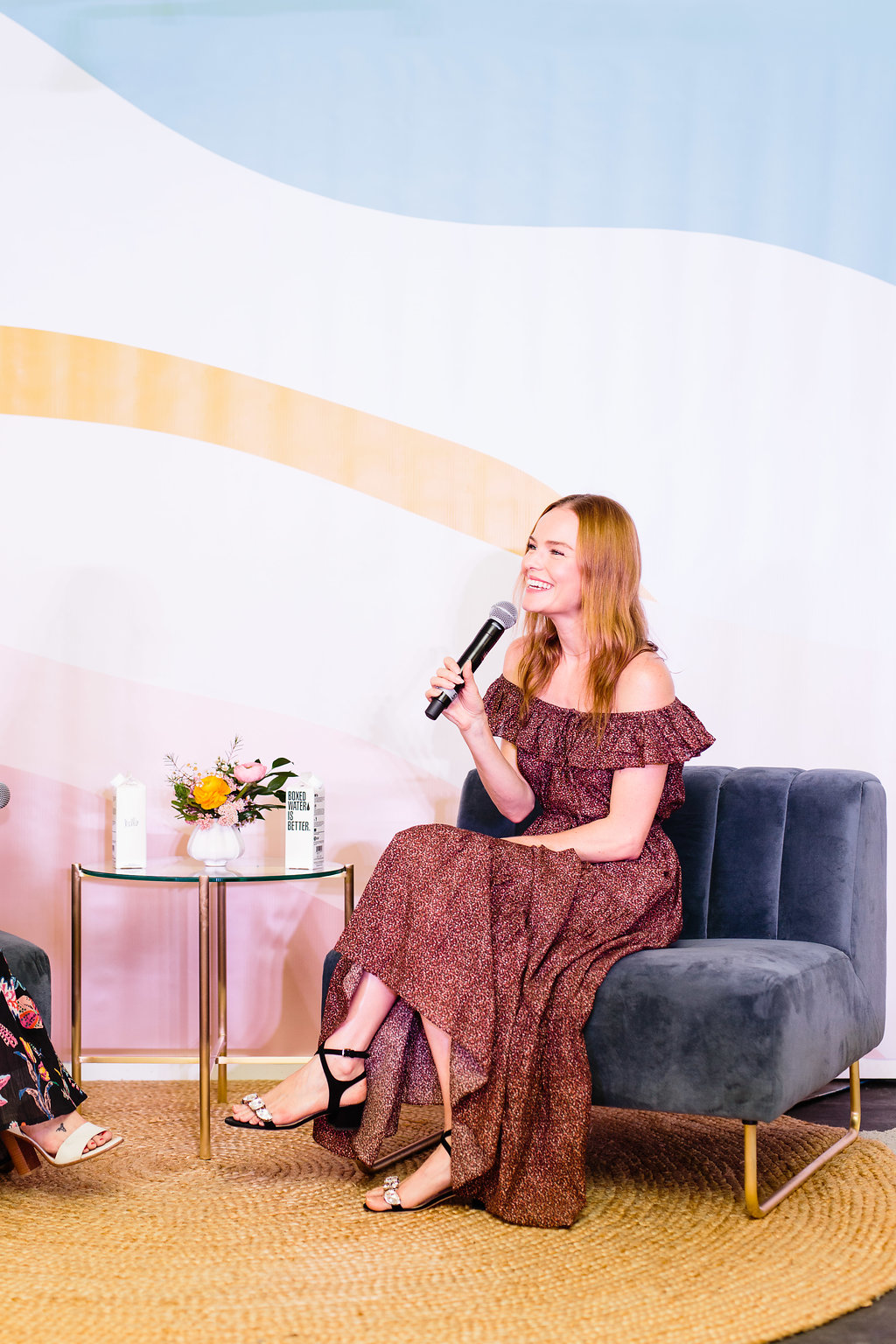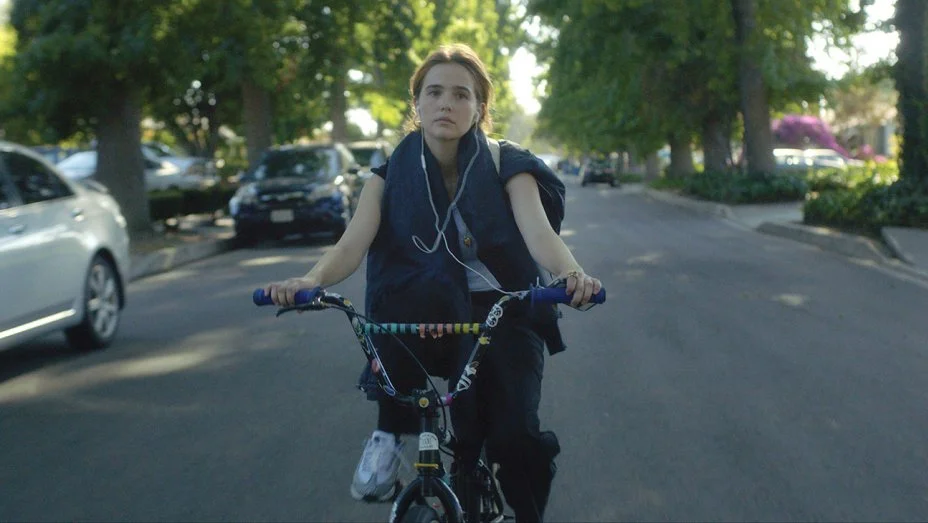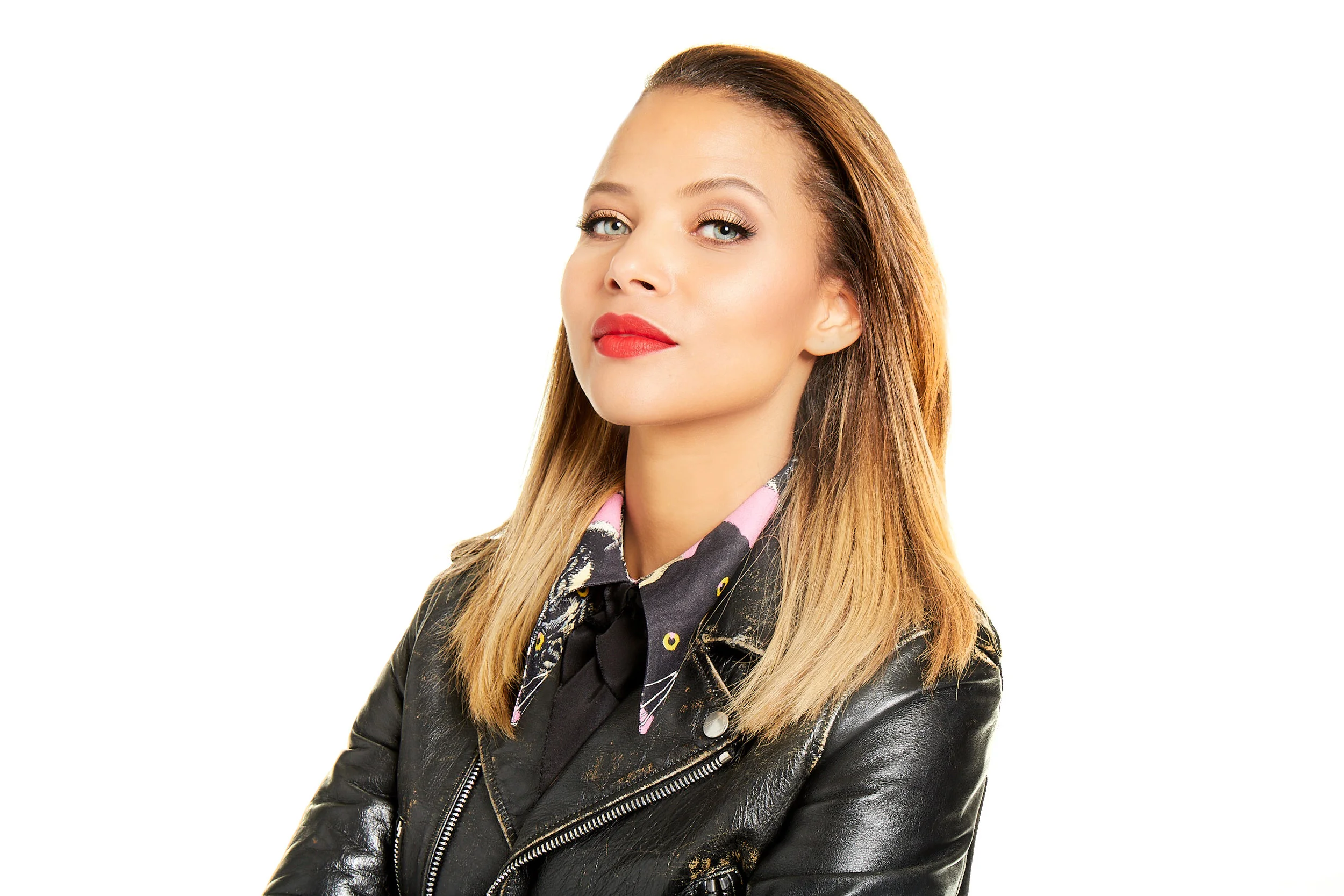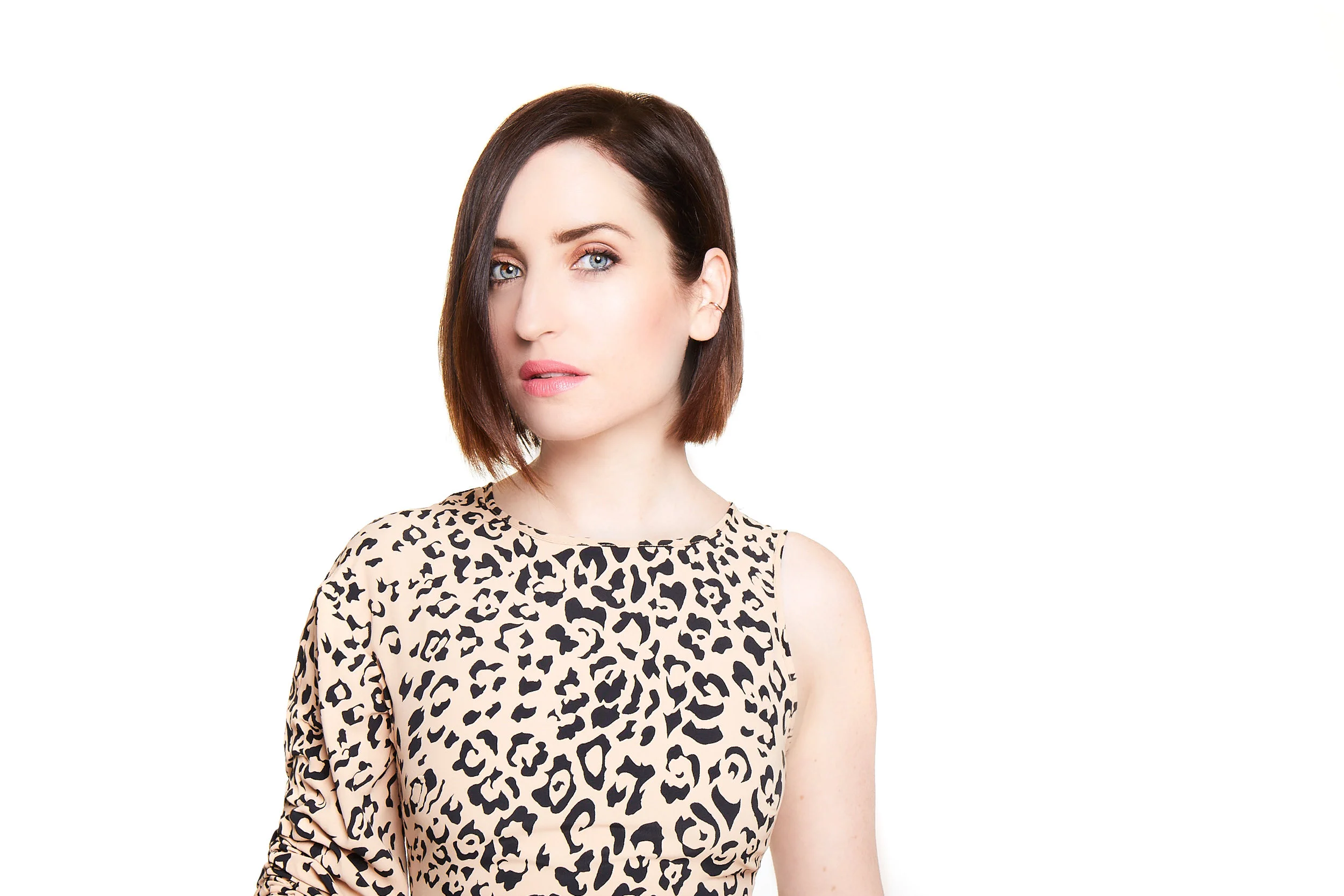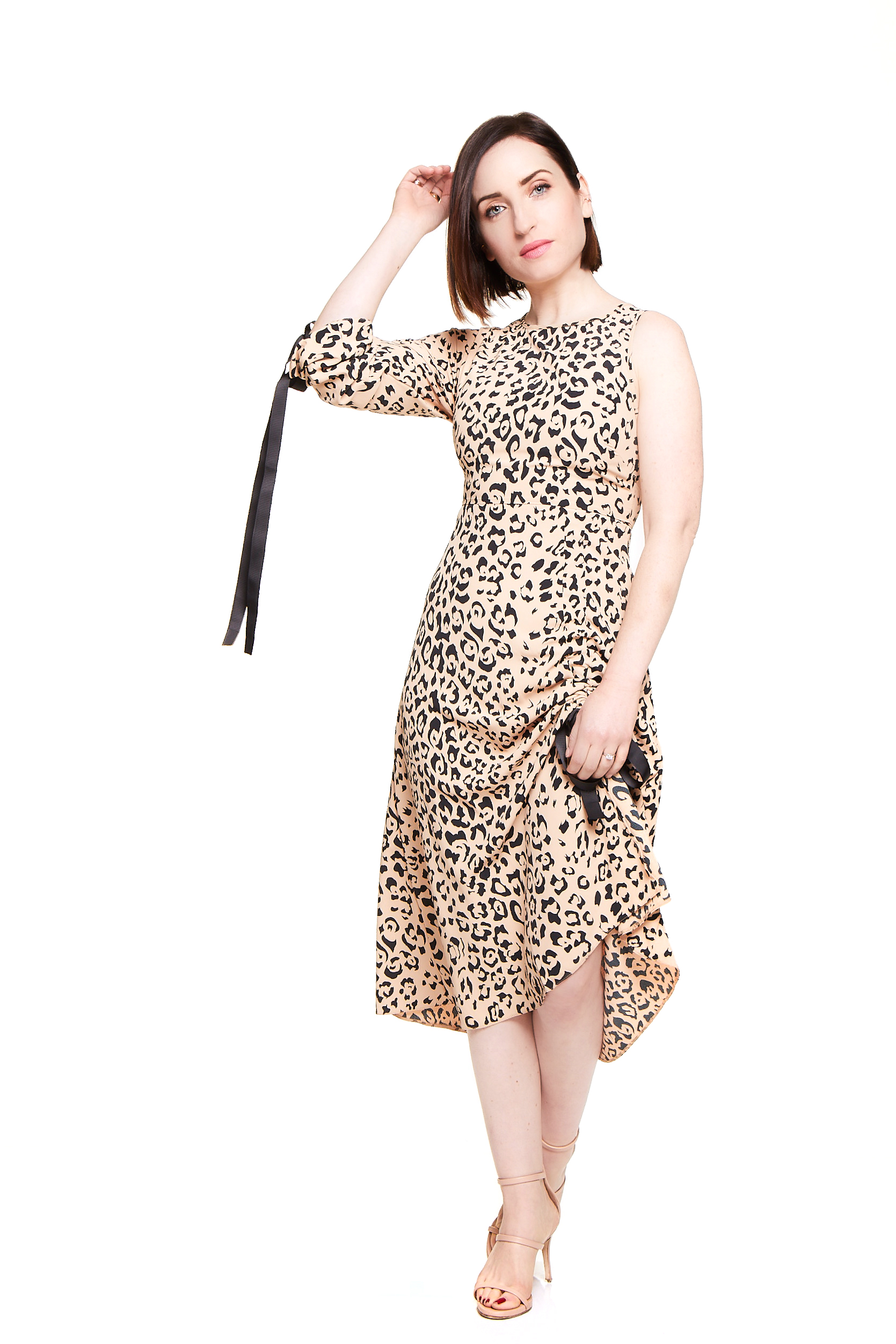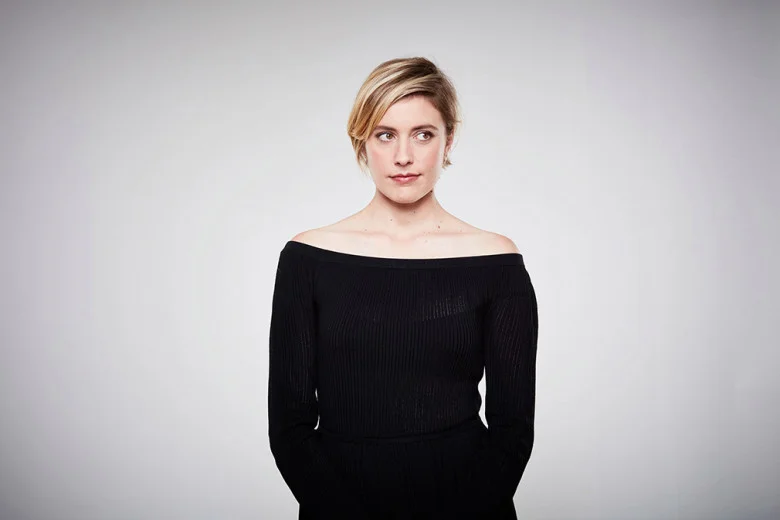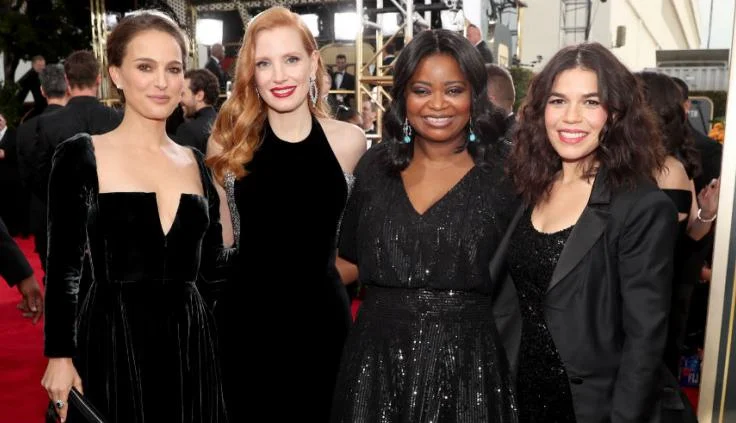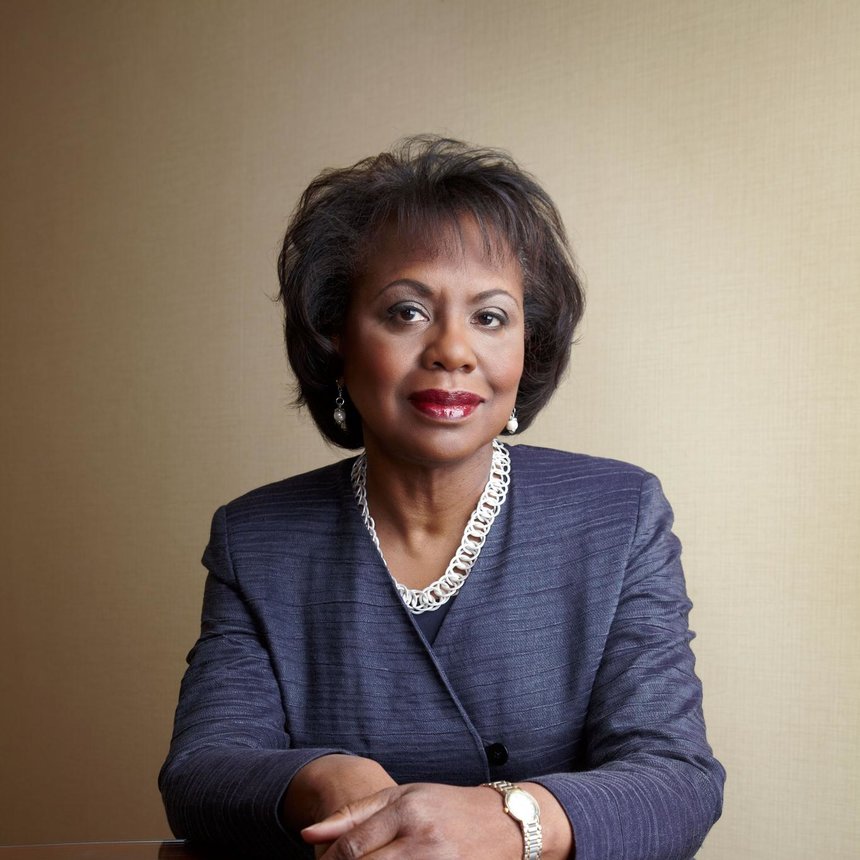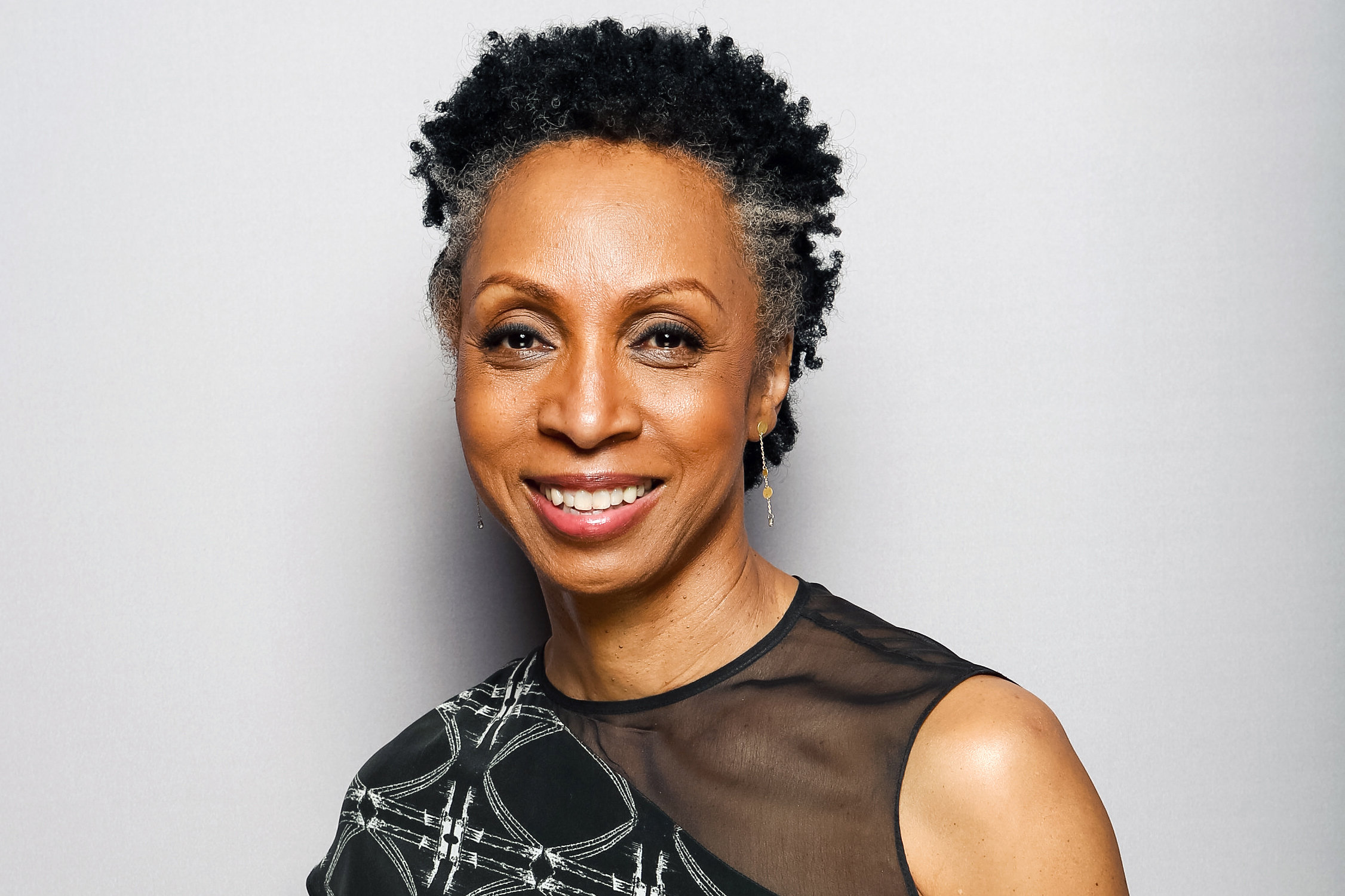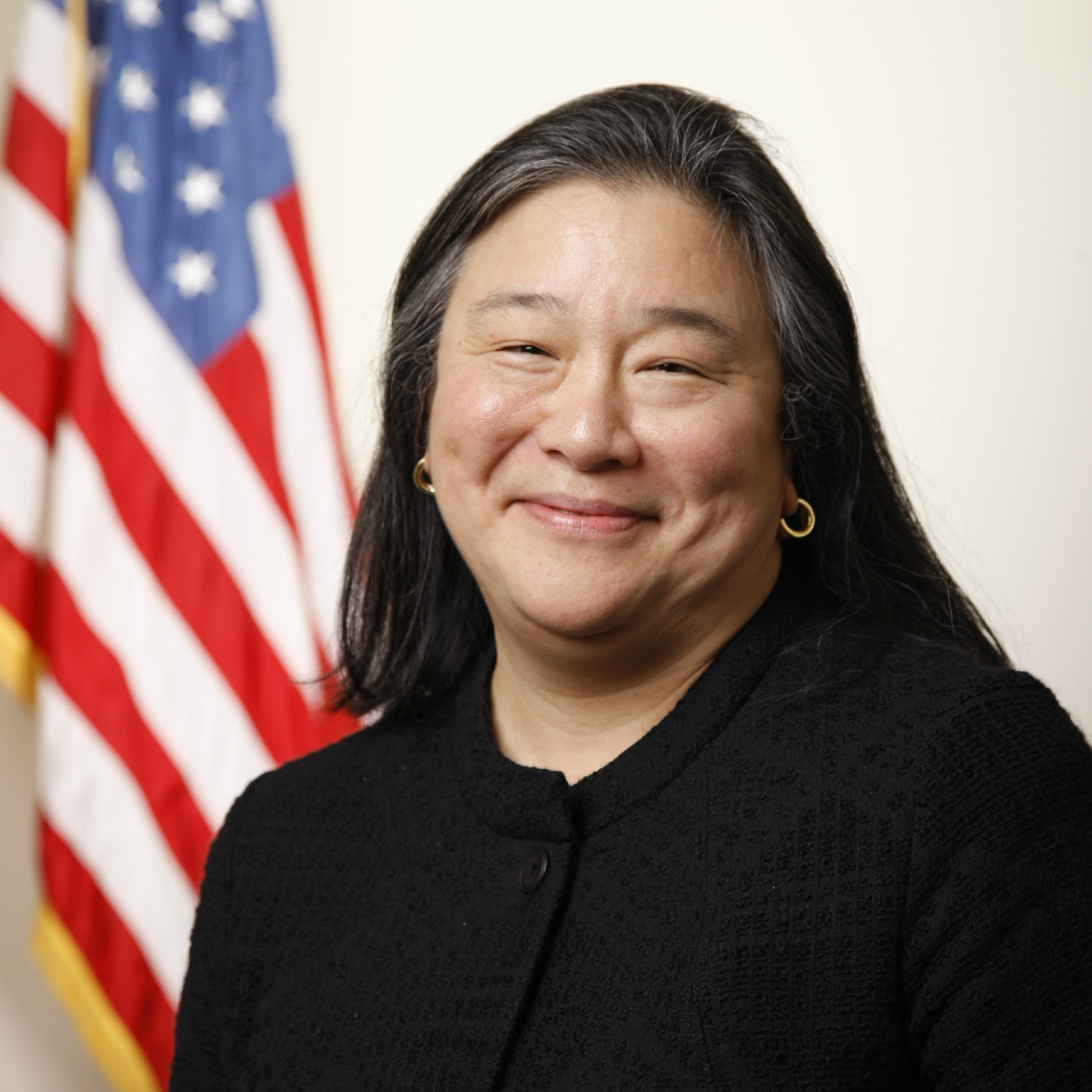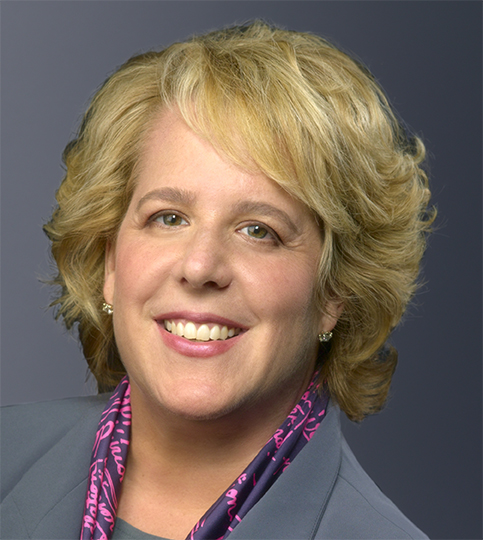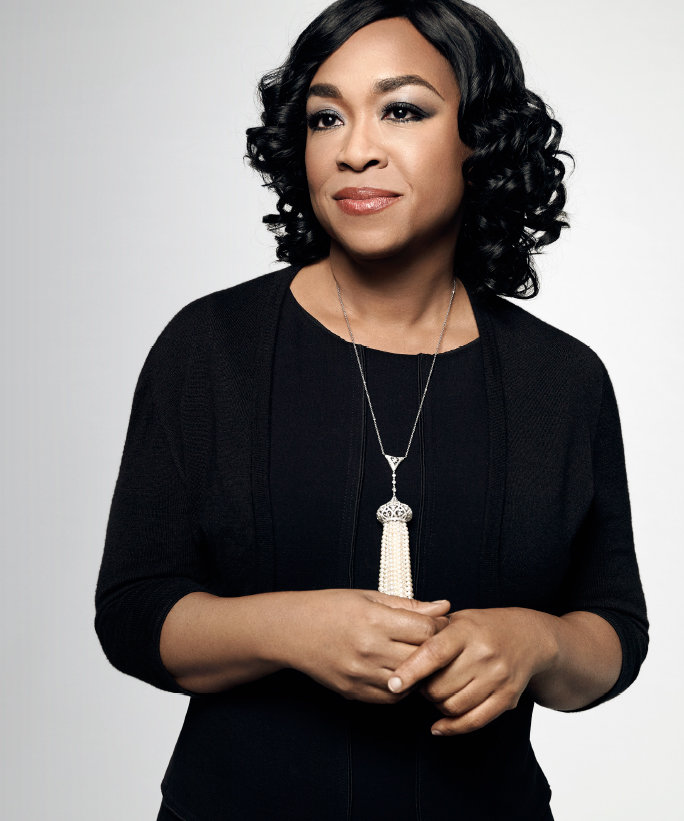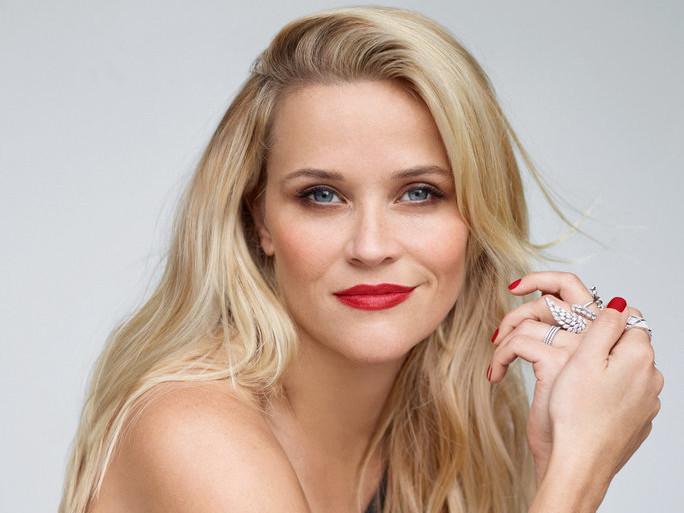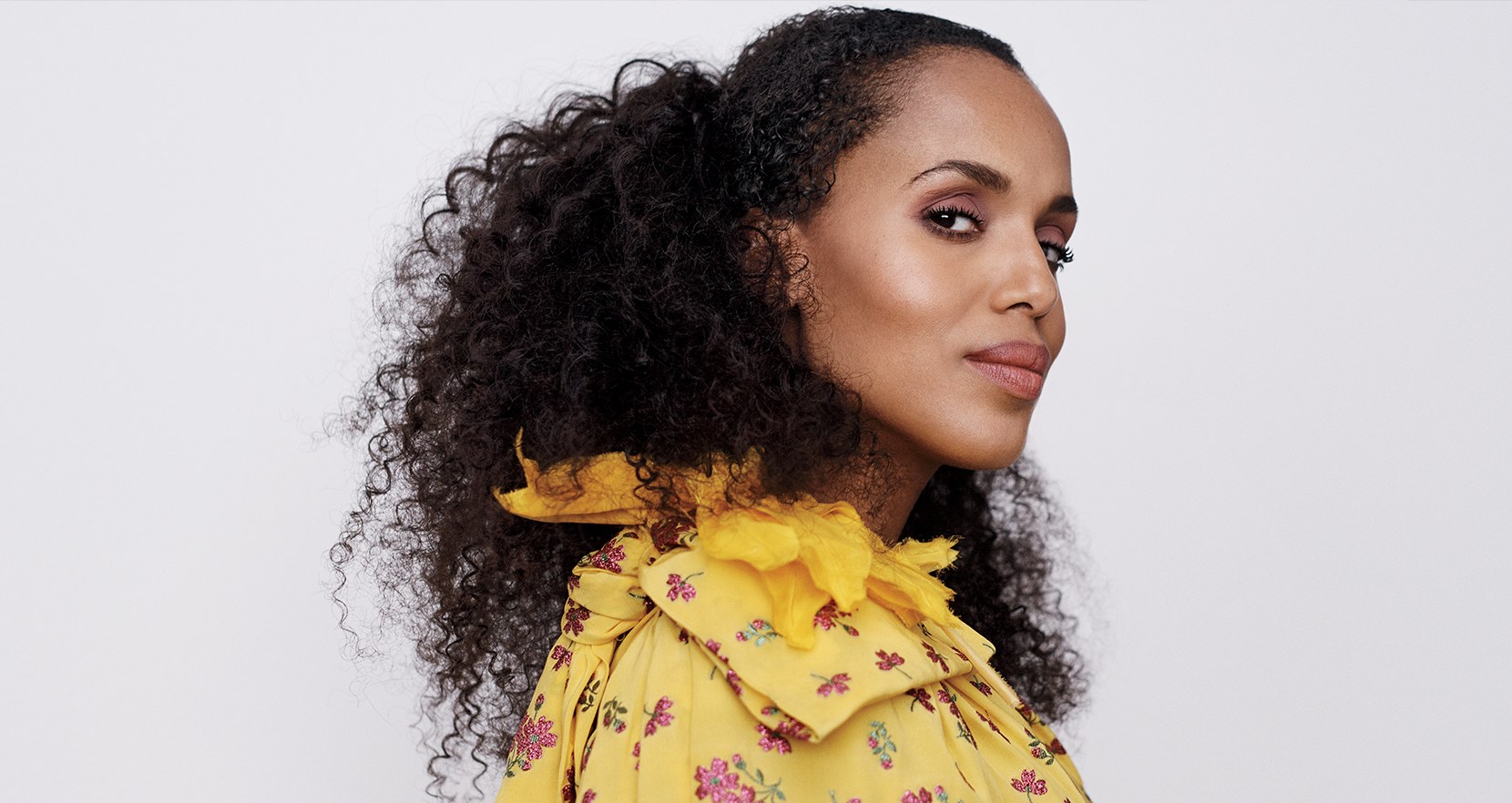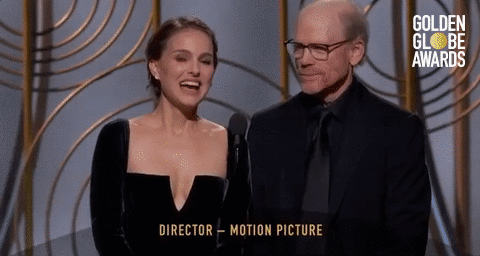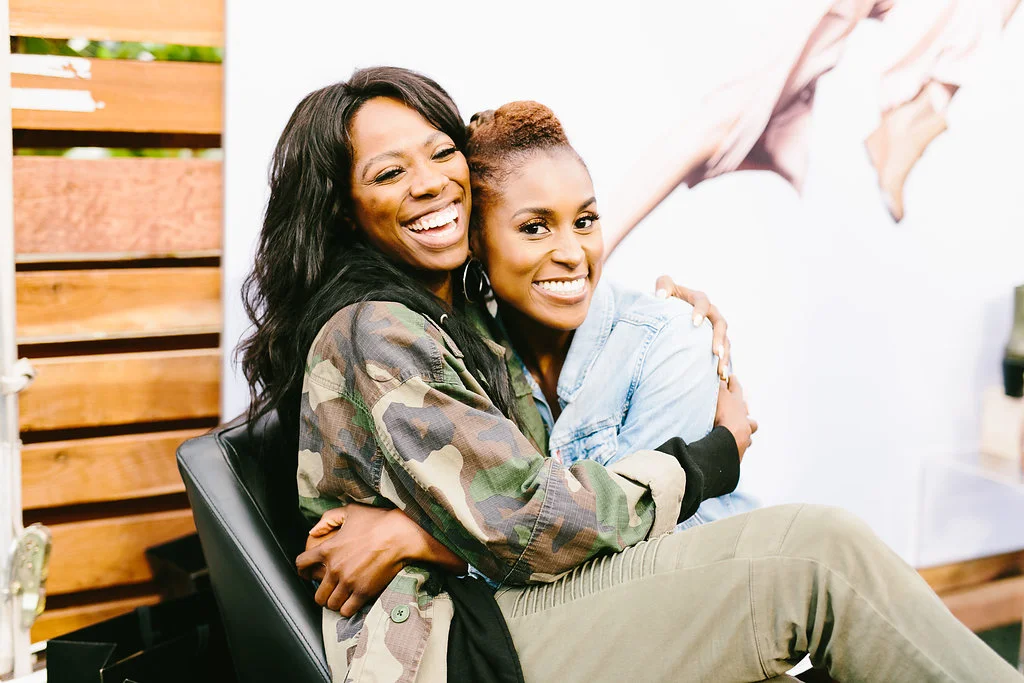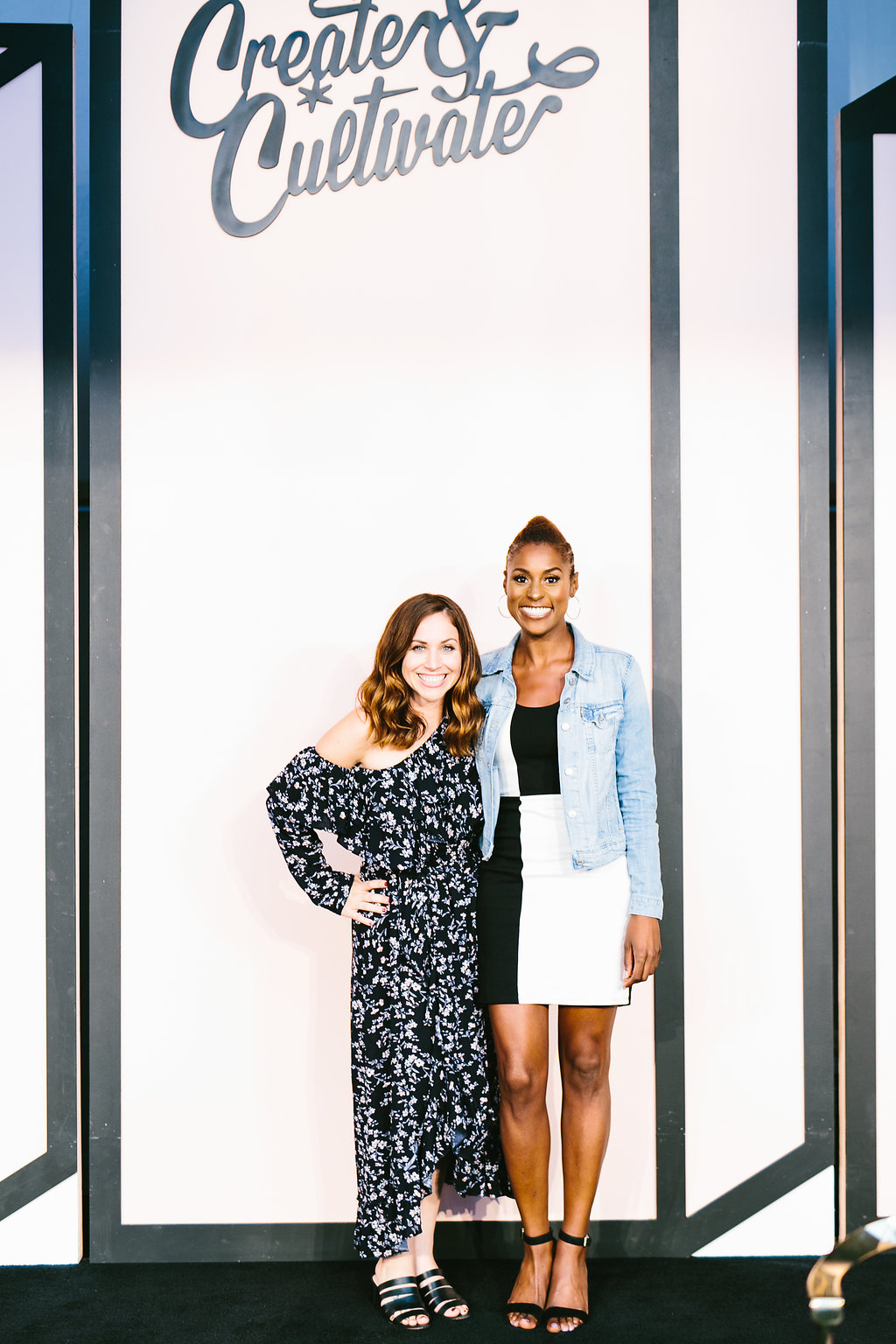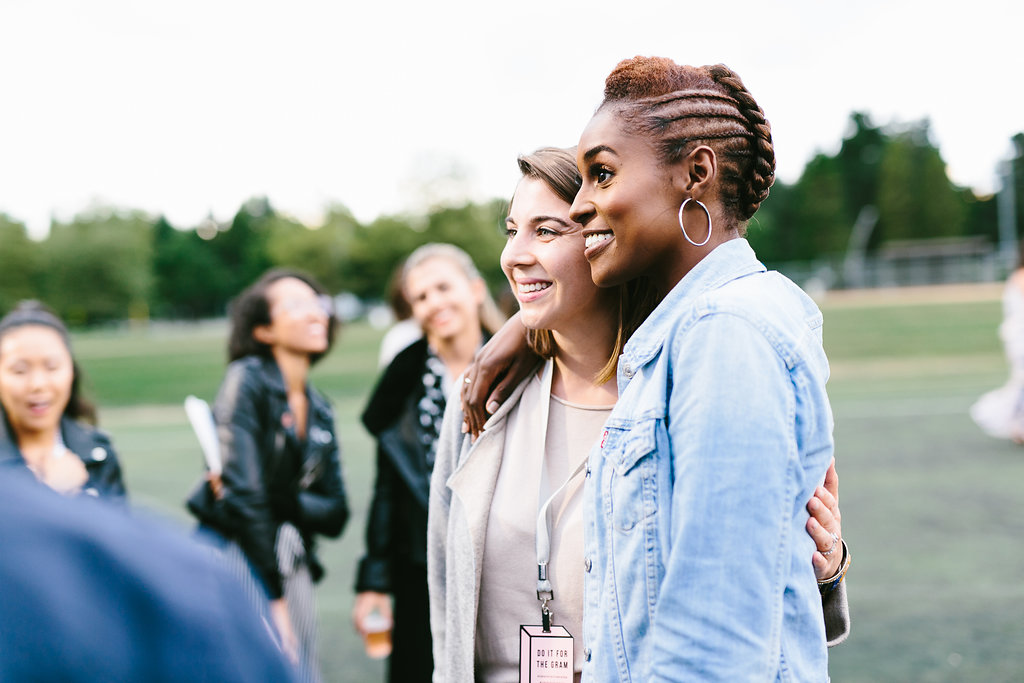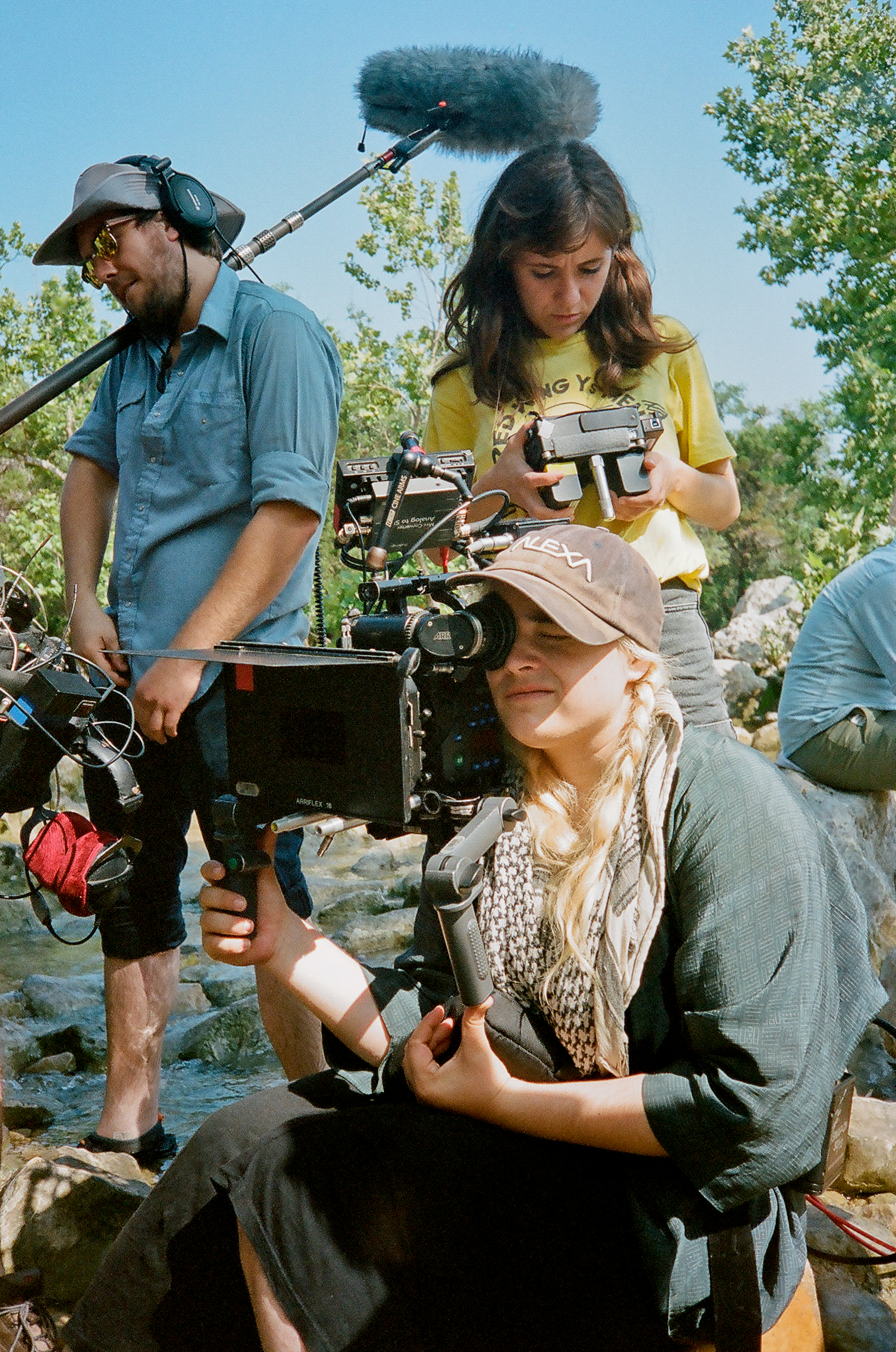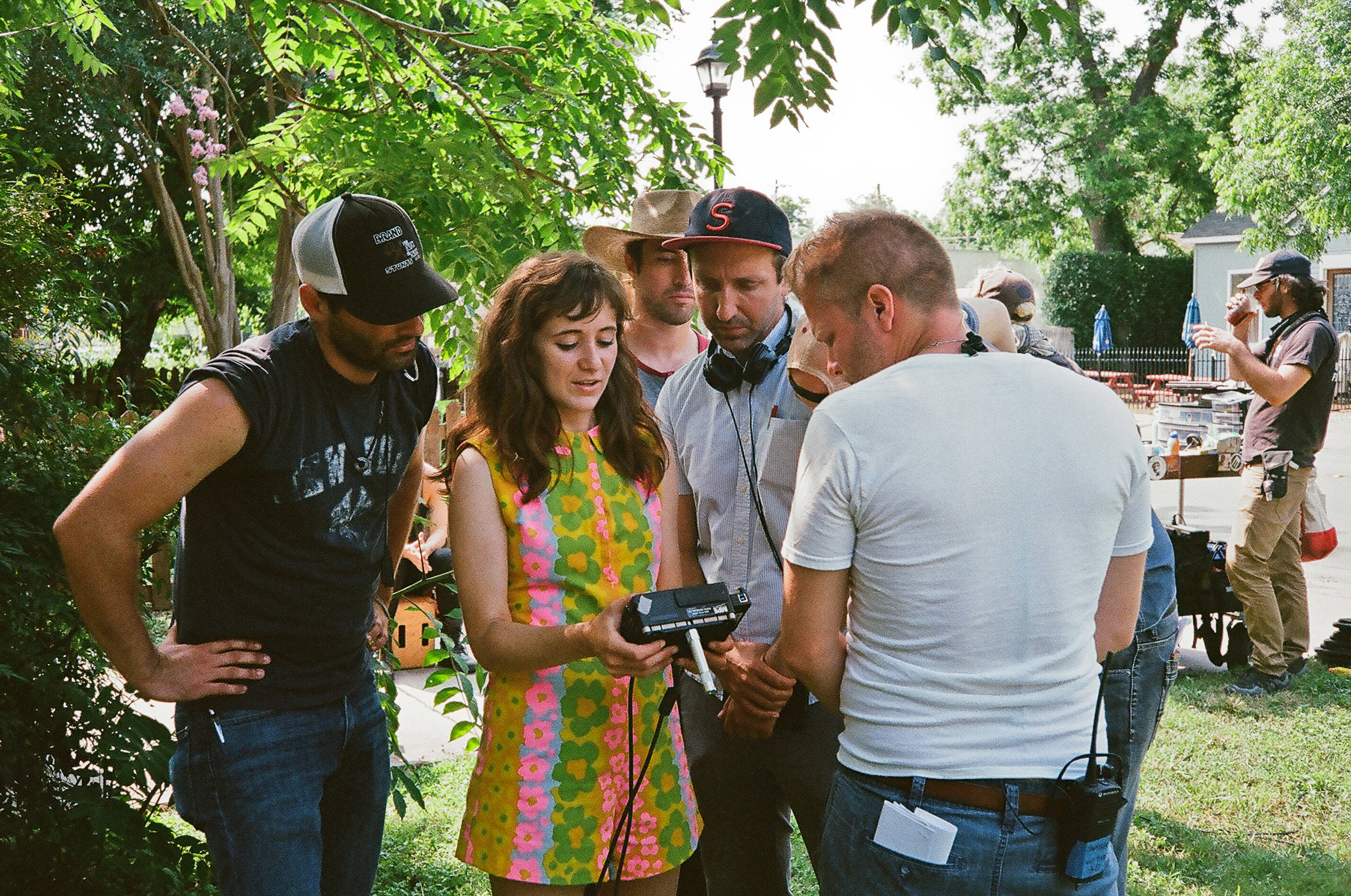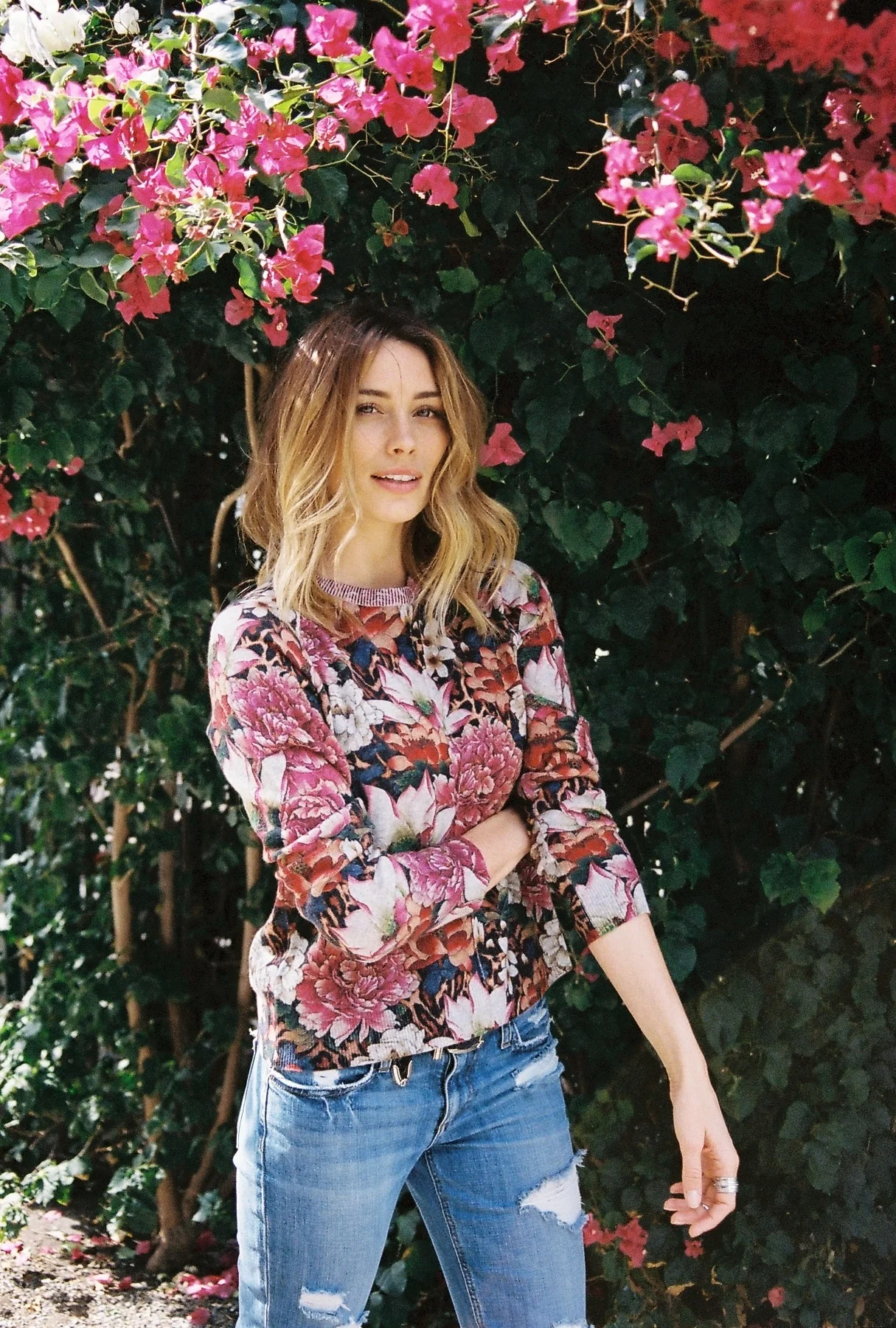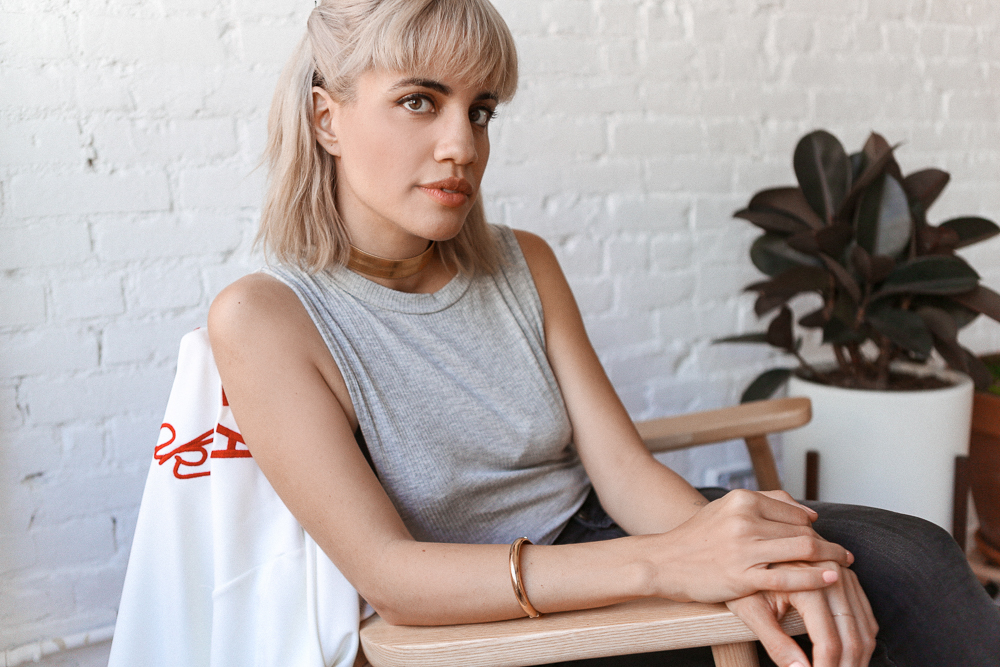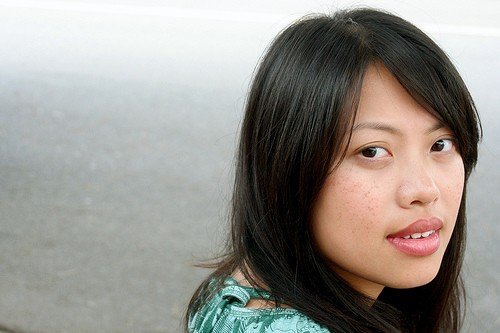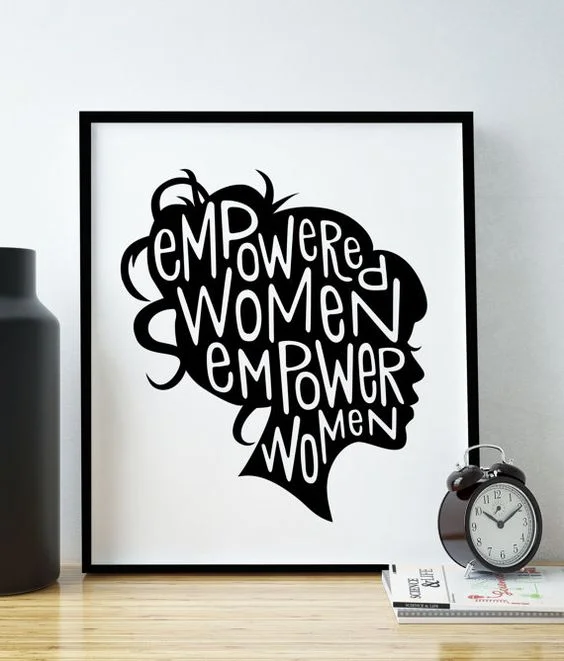Why Sophia Bush Says She's a Tender-Hearted Softie—Who Takes No Sh*t
Don't even.
SOPHIA BUSH IS A FORCE.
Read on.
Sophia Bush is the woman you want your daughter to grow up to be.
She's also the woman who would tell you to encourage your kid to be their own person. Forge their own path. It's certainly what she's done. The activist and actress jumpstarted her career when she dropped out of the University of Southern California at 21 to join the CW TV show One Tree Hill. On her 30th birthday, she built a school in Guatemala with the Girl Project. She's raised money for those affected by the Deepwater Horizon oil spill, lived on $1.50 a day to raise awareness about global poverty, taken to her platforms to call the GOP "heartless," supported diversity in Hollywood, gay marriage, and women everywhere.
We caught up with the powerhouse to ask, well, everything about her drive, passion, and badass squad (like the very rad, Ruthie Lindsey).
Read on.
You made a name for yourself in Hollywood, but activism has always been in your heart. What do you want to be remembered for?
What we do is not who we are. That’s true for all of us. Our careers, no matter what kind, are simply a piece of our greater life puzzle. So personally, I hope that the people who matter most to me remember me as a passionate person who stood up for others. As a woman who was for other women. As a friend who showed up to the best of her ability. And as a tender-hearted softie who took no shit.
I hope that the people who matter most to me remember me as a tender-hearted softie who took no shit.
You’re heading to Houston pre-Style Summit. Why is it important for you to be there early?
It’s devastating to see the effects of Harvey on Houston. But seeing folks step up and show up to help is deeply inspiring. I’m just hoping to do my part and lend a hand where I can. Beyond donating and sending clothing and other supplies, knowing that I have the opportunity to lend a literal hand means a lot to me. Our government may be lead by petulant children who feel that arguing about whether science is real or not — newsflash: It is. Arguing that it isn’t is as stupid as claiming that gravity doesn’t exist—but we as citizens can sidestep the madness and show up for our neighbors. That’s what makes this country so great. Us, and our commitment to and support of one another.
You’ve said that in your early career you felt treated like a “chess pawn.” Which, so many women experience, inside Hollywood and out. How did you come to understand your power?
Understanding power is an interesting notion, and I believe that it’s closely tied to self-worth. But self-worth is not a fixed destination you arrive at and then poof! You never feel insecure, or threatened, or anxious, again. Sadly. Wouldn’t it be great if it was!? As those notions of power and worth apply to career verticals, there are systems and behavior patterns in place that subjugate and challenge women everywhere. In every business. From micro to macro aggressions, we face consistent and unrelenting adversity. It’s exhausting. And for me, refusing to be treated as a chess pawn or a plaything or an object was a reaction to that adversity, and it's blatantly and undeniably unacceptable. There is only so long that people can and will put up with circumstances that are flat out wrong. Using my voice, and standing up for myself and those around me has made all the difference.
"Self-worth is not a fixed destination you arrive at and then poof! you never feel insecure."
Tweet this.
How have the past few years changed your thoughts on what your next five years look like?
The past few years taught me a lot about what I want, and also about what I will not tolerate. The positive and negative ends of the spectrum of recent experiences have both been great for goal setting. Everything is a lesson. And it all boils down to the truth that I’m ready to take more control of my career and what it looks like. That will affect projects I want to helm — as an actor, a producer, a director — and the way people working on those projects feel when they come to work. And that’s what I’m looking forward to most. Creating environments that feel safe, freeing, creative, and open. That’s perhaps the greatest way I’ve come to understand my power thus far. And I’m so looking forward to what’s next.
"Champion other women. And you’ll draw in women who do the same for you."
Tweet this.
You’re surrounded by such a stellar squad. Can you chat a bit about the moment when you knew female friendships would power you through?
I cannot remember a time when that truth wasn’t clear and apparent to me. The adage “it takes a village” exists in our cultural lexicon for a reason. We are communal beings. We find greater happiness in a community than in solitary existence. And my community of women is such an exceptional example of that truth. We are a family. We lift each other up. We challenge each other. We support each other in work, family, play, and adventure. I’m in awe of my friends’ brilliance and boldness. Their creativity and their capacity for love. I cannot say enough good things about them. We are a tribe of women that is truly for other women. And if you want friendships like that? Be a woman like that. Be for other women. Collaborate with other women. Champion other women. And you’ll draw in women who do the same for you.
Arianna Schioldager is the former Editor-in-Chief at Create & Cultivate. You can follow her @ariannawrotethis.
MORE FROM OUR BLOG
Kate Bosworth on #MeToo, Her New Movie & Her Solid Sense of Self
More like a pink crush.
On Saturday, actress and producer Kate Bosworth joined us as keynote for our Desert PopUp with MINI at the The Commune at the Ace.
Taking the mic in front of 1000 attendees, Bosworth shared about the ups and downs of Hollywood, what it takes to make it, and keeping a solid sense of self through the years. “My whole life has been swinging from the rafters, whether as an artist or student,” she shared.
Swings that included risky moves.
“I moved to LA on my own when I was 18,” Bosworth said about deferring from Princeton. Even though she was the first in her family to be accepted to Ivy League, she knew she wanted to be an actress. Her family was “thrilled,” but she had her sights set on making it in Hollywood. “I had a little studio apartment and started going on audition after audition after audition.” Furthering, “A lot of those roles didn’t have a lot of meat there.” All of the sudden Blue Crush landed in her lap. She felt plenty of affinity with the character, knowing, she said, “of what it was like to have a dream and want to achieve that dream.” But to also, “feel self doubt and fear.” Although she had never surfed, she went in to read for the breakout role that ultimately became hers.
But she didn’t land it immediately. The powers that be loved her for the part, but she needed to be able to surf. Bosworth had no idea how to ride a wave or paddle out. So the producer Brian Grazer and director John Stockwell told the novice they were going to try and cast real surfers for the role. That process would take about three weeks. During those three weeks Bosworth didn't twiddle her thumbs. Instead, she went out and found herself a surf instructor in Malibu. “For about 3-4 weeks and for 6-7 hours per day, I somewhat learned to paddle and not be a total amateur.” At the end of that time she called up both Grazer and Stockwell and asked, “Would you please watch me surf?”
She landed the role not because she was the best surfer, but because she was determined. She was athletically focused. “That’s something I like to impart on anyone starting out their career,” she said, “have focus, be determined, and know what you love and you will find a way.”
"Have focus. Be determined. Know what you love. And you will find a way."
“I look at my twenties with fondness and a lot of cringe moments,” Bosworth shared. “It’s only through experience that you learn things. You have to be willing and open to fail, which is hard for ambitious people. But you are going to fail. That will lead to something bigger and better.”
Most recently the actress has flipped her actress cap to producer for Nona, a film that chronicles sex trafficking work in Central America. Nona is an acronym for “No Name.” It tells the story of a girl from Honduras searching for a better life. “It was important for us to show the how,” Bosworth shared. “These are victims of very serious crimes and they are preyed upon.” The referenced "us" is Bosworth's husband a co-producer, Michael Polish, who also wrote and directed the film. It is the first feature from the pair through their newly formed production company, Make Pictures Productions.
As for the future, she’ll continue to make work that matters to her-- and that matters to her husband. “He loves women’s stories,” the actress explained. “I feel truly grateful to be married to a partner who talks the talk and walks the walk. And even in our most intense moments we’ll find something to laugh about pretty quickly.” What makes it work? She laughed, “A lot of kissing.”
What Bosworth doesn’t find a laughing matter are the #MeToo stories coming out of Hollywood. However she feels hopeful. “We all feel really similar and I think that’s really powerful. A female collective is happening right now, and as women in male-dominated work spaces, regardless of profession, we all felt a need to buckle down.”
“I love women,” she continued. “I love working with women. The one thing as an actress that’s very unsatisfying is that it’s very rare that you work with another actress. You’re often the ‘girl’ cast among six men. What’s great about this is that we’ve found ourselves working together. I do have a lot of hope. I think dialogue is important first and foremost. This isn’t a singular experience. This is a collective experience and we are better united.”
Arianna Schioldager is Create & Cultivate's Editor in Chief. Find her here.
Photo credit: Becki Smith House Photography. Find her here.
MORE FROM OUR BLOG
Zoey Deutch Is No Flower In Her New Movie
But she is blooming brilliant.
"Flower," the new dark teen comedy from director Max Winkler, starring Zoey Deutch was made in 16 days with a half a million dollar budget. Not bad for a flick that's earned a yellow check as a NYT Critic's Pick.
Not bad for a film that begins with an underage girl giving a police officer a blow job.
That's right. When we first meet Deutch's character, Erica Vandross, she’s performing oral sex on a cop in his squad car. Nearby, her own squad secretly records the encounter in order to blackmail him. They score a paltry 400 bucks from officer Dale (the entirety of his bank account), as part of an ongoing extortion hustled up by Erica to earn enough cash to bail her dear old dad out of jail. What, you weren't a vigilante at 17? As Deutch says in the movie’s trailer, “Shaking down a child molester is our moral obligation.” Sure, at her high school she gets called a “slut,” but Erica, rather believably to the credit of Deutch's portrayal, does not care what anyone thinks of her. “It's called feminism," she tells Luke (Joey Morgan), the son of her mother Laurie's (Kathryn Hahn) new boyfriend.
There are male critics who don't love the flick. But women (and the New York Times) are in agreement: it fucking rocks. For Deutch, who played the *almost* only female in Richard Linklater's "Everybody Wants Some," and last year's "Before I Fall" it was an opportunity to play a role traditionally written for a dude.
Erica is confident, but manic. Oogles the hot old dude at the bowling alley. Wears socks with slides, rocks a mean mom-jean short, a "Daddy" t-shirt, enjoys giving blowjobs and drawing said penises in her diary of dick. In short: Erica's not "likable," or so say the powers-that-be-reviewers. There are a laundry list of unbecoming traits that friends and fam heeded the actress against. "I must have poor reading comprehension skills. I thought she was fucking awesome," joked Deutch. "The unanimous response was, 'Aren't you afraid of playing someone potentially so unlikeable?'"
The answer simply, was no. In fact the only part of the movie that flummoxed the then-twenty-year-old was a dancing scene. "Blowjob scenes, totally fine," Deutch jokes. "But dancing was the worst. I'm the worst dancer."
"Blowjob scenes, totally fine," Deutch jokes. "But dancing was the worst. I'm the worst dancer."
But the way she carries the film is a dance. That between "likable" and "unlikable," teetering between the two so deftly that you're not, NOT rooting for her. Despite her shortcomings and occasional cruelty, you want Erica to win at life, to love herself, to reclaim her innocence, at least in some capacity. She's not without soul. She's certainly not without heart. "Flower" shows teens as they are-- not as they ought to be.
It's also fun and so refreshing to see this part played by a woman, you understand.
"This kind of character when played by a man is morally ambiguous," says Deutch. "When it's a woman," she continues, again returning to that word women all too often hear in the workplace, "she's unlikable." Contrary to the warnings of peers, Deutch says playing the role of Erica "is the most profound and fun and fulfilling thing I've done in my career so far."
"This kind of character when played by a man is morally ambiguous. When it's a woman she's unlikable."
Her director, Max Winkler, agrees. "I'm really proud of her performance," he says. "For a twenty year old to be able to carry a movie like that...I'm still not jaded by how good she is." It's an enthusiasm he likewise shared for his crew. On set, he says, "Almost all of our department heads, except for the gaffer and the grip, were women." Adding, "The set ran so much better. Everyone follows the DP on set, and there was no ego, there was no fighting."
"It was so weird for me to realized that I had never worked with a female DP," says Deutch of Carolina Costa, the film's Director of Photography. From there Deutch started looking into other film set stats. "Did you know that less than one percent of women score movies?" she asks. She didn't. Now she does.
Though the film was made two years pre-#metoo movement, there are parallels that alone make the movie worth seeing. Without giving away any spoilers, while the solutions the teens come to in moments of revenge, and subsequent panic, aren't necessarily the best solutions, they are still taking action. Which is something that Deutch is all about. "We're not capitalizing on the movement," says the actress, "but the hope is that all of the discussions breed more action."
MORE FROM OUR BLOG
Create & Cultivate 100: Content Creator: Denise Vasi
MINDFUL AF.
MINDFUL AF.
Denise Vasi has it Maed.
The actress (lead on the hit show Single Ladies) mother to Lennox Mae, wife to director Anthony Mandler, and founder of Maed, the soon-to-be launched lifestyle site committed to impact. Self-care tops her list of priorities. As does fostering open and honest convo, whether that's with Lennox, or her hundreds of thousands of IG followers. Denise is constantly dolling out her truth with her own spin on old adages.
"One day, or day one. You decide."
"The past is a place of reference. Not a place of residence."
"Be soft, kind, and loving. But also take nobody's shit."
She doesn't settle and she doesn't want you to either. She has it "made" because she made it herself. A Brooklyn native, Vasi signed to Ford Models at the age of 12. "For modeling they said I was too tiny, I wasn’t Caucasian enough, I wasn’t African American enough, I wasn’t Latina enough. They kept saying no but I kept moving forward and fighting my way in everyone’s door."
And we're glad she did.
More from Denise below.
Name: Denise Vasi
Instagram: @densievasi
Where do your drive and passion come from?
Launching Maed has always been about creating impact. Surely there will be shifts while the brand evolves but Maed strives to inspire others and that will always remain the heart of my brand. Being impactful is the force that drives me.
When you run into a career obstacle, what drives you forward?
I used to be easily stymied by obstacles, so I had to change my way of thinking. Knowing that any challenge at hand was actually an opportunity to educate myself, a chance to dig deeper, ask myself more questions and that ultimately from it all I would grow--- holding on to that is what pushes me through.
"Any challenge at hand is a opportunity, a chance to dig deeper."
Tweet this.
What is your biggest pet peeve?
People who don't deliver all that they say they will.
What are your biggest fears about running a business?
Letting my mind get in my way of my creative process.
What's something you'd like people to know about your job that they probably don’t?
That it's not a job it's a passion project. I love what I am creating and I love the community that I'm creating it for.
IYO-- How can we stay original when we are so saturated by other people's work?
I think because of the access we have today, it's hard to say 100 percent that we are not somewhat informed by others. That's not necessarily a bad thing. I do believe that the past informs the present and that to be great at what you do, you should study those that came before you. That being said there's a slippery slope between being influenced by and imitating someone's work or style. For me, I stay original by sticking to what I immediately gravitate to and staying true to my creative eye. When something does inspire me, I look at how I can dig deeper or build on the concept. Adding value to something is the most positive way to pay homage IMO. Also, you should always give credit where credit is due!
Being impactful is the force that drives me.
What about your career makes you feel the most complete?
That the path laid out for me is my own.
If you had to trade jobs with anyone else in the world, who would it be and why?
OPRAH... need I say more?!
At what point in your career did you find the confidence to really take charge and become the woman you are today?
I've always been on the journey to becoming the woman I am today whether I knew it in those exact moments or not. Things definitely changed after I gave birth to my daughter. Soon after, I figured out I wasn't ready to go back to acting. While I didn't exactly know what was next for me I felt so incredibly empowered-- I knew I could do anything.
What's the best advice you've ever been given? Or your favorite piece of #realtalk?
Build meaningful relationships and look at others in your space as potential partners. Rather than viewing them as competition try to create dynamic ways to collaborate.
When you hit a big bump in the road, how do you find a new road or a detour?
I sit back and evaluate the situation, then I make a list of all the possible solutions. Writing things down really helps me work thru things. I also have a group of 3-4 people that I reach out to when I need to brainstorm.
What song do you sing in the shower when you’ve had a bad day?
Whichever nursery song I listened to 72 times the night before while putting my daughter to sleep :)
Photo Credit: @davisfactor
Hair & Makeup: @SmashboxCosmetics @TheGlamApp @TheOuai
TO SEE THE FULL CREATE & CULTIVATE CONTENT CREATOR LIST CLICK HERE.
Create & Cultivate 100: Entertainment: Aidy Bryant
THE MOST FUN(NY).
THE MOST FUN(NY).
photo credit: Mary Ellen Matthews NBC
Dogs will always make her laugh and her grandma thinks she's funny.
So do the unprecedented number of people who tune in Saturday Night Light every week to catch Aidy Bryant and her cast mates.
An American actress and comedian, Aidy got her start in Phoenix, Arizona. By that, we mean she was born there. She then moved to Chicago to study comedy with Second City, before joining SNL at age 25, making her one of show's youngest cast members ever.
And has made herself known for skits like, "A Girl's Halloween," and her portrayal of Sarah Huckabee Sanders. "We did it girls!" she shouted in a recent cold opening, about the women's march in Huckabee's classic middle party and too-tight-around-the-collar pearl necklace. Aidy herself is not a pearl clutches. According to a recent profile on The Cut, she prefers crystals, or as she calls them "rocks."
Here's to Aidy rockin' it on SNL's 2018 season. More from the funny woman below.
What lit your funny fire bone?
My parents are super funny. So there was always a lot of laughing in our house, I think I just put a value on that very early on.
Does your grandma think you're funny?
Yes.
As one of SNL's youngest joining cast members, what would you say to our audience -- most are young, entrepreneurial go-getters who get a little scared sometimes...?
I was hired at 25. Which I'm grateful for. By that time I had been working in comedy professionally for about seven years. I felt like I had trained and put in the hours to know that even if I wasn't experienced in television I trusted my instincts.
"Even if I wasn't experienced in television I trusted my instincts."
Tweet this.
Since you recently told The Cut that you turn down a lot of roles because they are offensive, do you think you'll take matters into your own hands and write a feature?
Maybe. I love to write. But I'm working on other projects right now. I really love television, I love that you get to stay with a character for more than just a few hours. So maybe!
Who would be your go-to writing partner?
There are lots of people in my life who I've loved writing with. I really could never choose one.
What's been your favorite SNL skit?
I love doing music videos. I really loved making "Back Home Ballers" and "Twin Bed" and "Wishing Boot."
You and stylist Remy Peace are working on the beginnings of a fashion line. When might we expect that to come out?
We don't have an exact date yet. But we are planning on some time in 2018.
What would you call your superpower?
Picking up on other people's feelings and vibes. I'm a good people reader.
What's something that will always make you laugh?
Dogs.
TO SEE THE FULL CREATE & CULTIVATE ENTERTAINMENT LIST CLICK HERE.
Create & Cultivate 100: Entertainment: Zoe Lister-Jones
THE QUADRUPLE THREAT.
THE QUADRUPLE THREAT.
“I spend a lot of time in hair and makeup,” says Zoe Lister Jones.
This is something about her glamorous Hollywood job that the writer/director/actress/feminist badass wants people, especially young girls striving for perfection, to know. As the star of the CBS family drama “Life in Pieces,” Lister-Jones fumbles through new parenthood alongside her co-star and TV husband Colin Hanks. In “Band-Aid,” the feature film she wrote, directed, and starred in last year, Lister-Jones plays ½ of a 30-something married couple still reeling from the unspoken pain of a miscarriage. (She also employed an all-female crew.)
Committed to “storytelling as a means of change,” the Brooklyn-born actress may need hair and makeup on set, but behind the camera she has no trouble making waves.
More from Zoe below.
Name: Zoe Lister-Jones
Instagram: @zoelisterjones
What matters most to you about your job?
Storytelling as a means of change
When you don't always know where your next job is coming from, how do you keep your drive and passion come alive?
I need to write to process questions and quandaries that perplex me, whether personal or global. So that's helpful in fueling the fire. Art as a cathartic act.
If you ran the world, what one law you would enact?
Women have equal rights and equal pay worldwide.
Where do you think good ideas come from?
Hard questions.
"Good ideas come from hard questions."
Tweet this.
What has been your biggest opportunity and at the same time your biggest challenge?
Probably directing my first feature lm. But the challenge was ultimately part of the joy.
What's something you'd like people to know about your job that they probably don’t?
I spend a lot of time in hair and makeup. Girls and women need to know that the impossible standards of beauty we are faced with every day in pop culture imagery are rarely attainable without a team of professionals, and airbrushing, and a whole bunch of other bullshit. We gotta start to love ourselves more completely just as we are. I struggle with it too. We all do.
We gotta start to love ourselves more completely just as we are. I struggle with it too. We all do.
What about your career makes you feel the most complete?
Creating my own work. Writing a story and seeing it come to life. The freedom I feel when I'm opposite a great actor and some unquantifiable magic occurs.
If you had to trade jobs with anyone in the world, who would it be and why?
I'd trade jobs with Donald Trump just to get him out of office.
I put you on the spot the last time we talked and asked you to share the last thing you punned in a text. Gonna hit you with it one more time...
Don't want none unless you got puns hun.
At what point in your career did you find the confidence to really take charge and become the woman you are today?
Well directing was certainly a turning point, and required the confidence to believe I deserved to be in that position. I think I felt I had put in the work, and was excited by the possibility of doing something that scared me.
What's the best advice you've ever been given? Or your favorite piece of #realtalk?
Cheesy and cliched, but "The only person standing in your way is you."
What song do you sing in the shower when you’ve had a bad day?
"Dreams" by Fleetwood Mac.
Photo Credit: @davisfactor
Hair & Makeup: @SmashboxCosmetics @TheGlamApp @TheOuai
TO SEE THE FULL CREATE & CULTIVATE ENTERTAINMENT LIST CLICK HERE.
Create & Cultivate 100: Entertainment: Greta Gerwig
THE RECORD BREAKER.
THE RECORD BREAKER.
photo credit: Daniel Bergeron
According to the NY Times, Greta Gerwig once peed in her pants during a math test.
The 7th grader was new to the school, didn't know the rules, and instead of risking it, she peed. A puddle forming by her desk.
It's the exact kind of scene you might have found in her independent box office record breaker Lady Bird, the story of a high schooler, played by Saoirse Ronan, her relationship to her mom, her hometown, and the kids around her. Lady Bird opened to limited audiences its first weekend, showing in four locations. It flew (bird jokes) past typical ticket sales for smaller box office openings of its kind, grossing $375,612 in fourtheaters, with a theater average of $93,903, making it the best speciality box office opening of 2017.
Reason to pee your pants if we've ever heard one.
However, luckily, Greta is now surrounded by praise, not puddles. Nominated for a Golden Globe and SAG Award, the first time director, has taken Hollywood by surprise and excitement. Award-Winning actress Natalie Portman raved that she has been waiting twenty years to see a movie like Lady Bird.
Audiences and critics agree.
More on Greta's triumph and quirks below.
On a stack of bracelets on her wrist:
I’m a sucker for anyone who tells me, "It’s a magical stone, and it’s going to keep you safe."
On trying to get funding for Lady Bird:
What I typically found was that if they had daughters or had been raised with sisters, they understood what it was, and if they didn’t, they kind of couldn’t believe that women actually fought like that, which was an interesting window into why some stories can’t get told. People don’t understand that they’re even a story to tell.
On documenting female stories:
I didn’t know how many [female filmmakers] there were and I didn’t know how important it was, but even though I didn’t want to make works like that, it sparked something in me and led to me going, "I need to do this.” I think women tend to focus on stories that men don’t have the privilege of seeing, particularly things that are domestic. ‘Jeanne Dielman,’ so much of that movie is static shots of her doing housework. Chantal Akerman said that is the lowest on the totem pole of cinema language; we value the image of a woman doing anything else besides housework. There was something about that intimacy with making dinner or making a bed that was really interesting to me. It felt like there was this whole world left to be explored that had been largely undocumented.
"Sometimes you can get real fixated on going through the front door of the castle, but you don’t always need to."
Tweet this.
On Lady Bird's agency:
I feel like allowing a young woman to experience desires and not just utterly punching them for it is weirdly not that common. Lady Bird is so inside of her own desires and able to be the active person in her own life. She’s not ever waiting to be looked at; she’s the one doing the looking. Even when it’s misguided and even when she messes up and fails, it’s not disallowed.
On going against the grain:
Sometimes you can get real fixated on going through the front door of the castle, but you don’t always need to. You can sometimes go through a side door. Sometimes you don’t even need to go in. You can just set up a camp outside and have your own party. I think more often than not, that’s what it ends up being.
This has been edited and condensed from multiple sources.
TO SEE THE FULL CREATE & CULTIVATE ENTERTAINMENT LIST CLICK HERE.
Create & Cultivate 100: Entertainment: Gal Gadot
THE IRL WONDER WOMAN.
THE IRL WONDER WOMAN.
In 2017 Wonder Woman finally got the super hero and blockbuster movie it deserved.
Played by Gal Gadot, an ex–Israeli soldier and actress, caused Wonder Woman fever at the box office. Studio projections suggested the film would gross $65 million in its opening weekend in the U.S. Instead, it earned $103 million, female moviegoers turning out in record numbers.
Surprise! We like a female superhero.
Gal also made headlines when she refused to stay attached to the franchise if producer Brett Ratner stayed on board. It was soon after announced that he would no longer be attached to the project.
That's what we call superpowers.
More on Gal below.
On her Hollywood plans:
I feel like I'm just in my beginning. After ten years [of acting], now I'm starting.
On what she was like as a kid:
I really liked to perform. My mother always tells this story: I was five. They had a party, and they'd put me to bed. I heard everyone on the rooftop, and I went upstairs. No one paid any attention to me, so I took a hose and sprayed everyone. [Laughs.] Very elegant, right? "It's meeeee! Look at me!" I loved the attention. But I never connected all the dots that maybe I should be an actress.
On acting:
It's going with but feeling without.
On communication in English and Hebrew being her first language.
Language is about communication, and if you don't feel comfortable with your accent, you don't feel comfortable to communicate. If you learn that you're different and it's okay and you feel comfortable with it, then slowly other people start to feel comfortable with it.
I like it that it's a vulnerable place, and I expose it because I learn more [from] it. I wouldn't want to be in a place where I say wrong things and people are afraid to correct me… [Sometimes] I feel so stupid. Because in Hebrew, whenever I take interviews, whenever I speak to anyone—I read a lot growing up, and it's important for me to sound eloquent and have good vocabulary, and be really precise with what I intend to say—I have the grammar. But in English, it doesn't matter how many times I'll read—you know, I'll make a list of words that I like to use—it's just not in my DNA yet.
"I say let's own who we are and use it as a strength."
Tweet this.
On female strengths:
I think women are amazing for being able to show what they feel. I admire women who do. I think it's a mistake when women cover their emotions to look tough. I say let's own who we are and use it as a strength.
This has been edited and condensed form multiple sources.
TO SEE THE FULL CREATE & CULTIVATE ENTERTAINMENT LIST CLICK HERE.
Create & Cultivate 100: Entertainment: Tiffany Haddish
TIFFANY HADDISH 2020.
TIFFANY HADDISH 2020.
Should Tiffany Haddish be President?
If the job was based on a candidate's ability to make us laugh, we'd vote yes. Tiffany was a much-needed reprieve during that endlessly L-O-N-G-W-T-F 2017. From her stories about Will and Jada and Groupon (which went viral), to her breakout hilarious supporting role in Girls Trip, Tiffany had us ROTFL when the rest of the world had us in tears.
And even though her story is a bit of a tear-jerker, she's never let it stop her. It's positively inspirational. The witty woman has been performing at The Laugh Factory since she was a teenager. But her childhood is nothing to laugh at. Tiffany frequently shares about growing up in foster care and stints spent living in her car.
Still, Tiffany is the first black woman standup to ever host Saturday Night Live in its four-plus decades. She also managed to release her memoir, "The Last Black Unicorn." And she's now an official spokesperson for Groupon, which makes sense seeing as she's in the top 1% of their users.
More from our next President below.
On success:
I'm still living in the same place, and -- none of your damn business where I live -- but I'm still driving a Honda. I'm trying to decide if I should get myself the Tesla SUV or if I should get myself a new pair of shoes. I don't know I think I'm going to go with the Ted Bakers because they might be a little cheaper, but the Tesla though.
On her social worker Colita Louis:
I thought it super necessary to thank her because she basically saved my life. She got me out of that living situation, and she noticed that I had something and she got me into Laugh Factory Comedy Camp. I went to the comedy camp and it changed my whole world and I'm so grateful to her for that.
On potentially saving the world:
I obviously went through these things for a reason, and if it's not to share with other people so they can handle their situations better, well, I don't know what the hell I went through it for. I might as well share it because this the only life I got to live and who knows it might save the world.
On eating kale with Taylor Swift:
When I met Taylor Swift, she was reciting my jokes back to me telling me how much she loved me. I'm going over to her house. … We supposed to be eating baked chicken and quinoa salad with kale and all this healthy stuff and talking and laughing. I'm going to hang out. It's going to be great. Taylor Swift knows I'm [all] jokes.
This interview has been edited and condensed from multiple sources.
TO SEE THE FULL CREATE & CULTIVATE ENTERTAINMENT LIST CLICK HERE.
Stars of The Teachers Talk Writing Process & Working with Friends
Crushing on women who are crushin' it.
The Cast of TV Land's The Teachers
TV Land's Teachers is an irreverent ensemble comedy about six elementary school teachers based on a web series created by The Katydids and Matthew Miller. The Katydids, a comedic troupe of six women from Chicago whose names are all derived from Katherine, wrote, executive produced, and star in the show (C&C fave Alison Brie is an executive producer), which is entering its third season.
We were able to grab the attention of 2/6, which is an F by school standards, but def an A in content.
Kate Lambert & Kathryn Renée Thomas chat with us on everything from the writing process to being scared to audition to superpowers.
On the writing process:
What does the writing process look like for the six of you?
Kathryn Renée Thomas: We generally spend the first 10 to 15 minutes talking about garbage. We have to get it out. We all arrive in the morning and have to gossip about what horrible things Trump tweeted last night or whatever Real Housewives did-- we cover all the really important things. Then we just dive right in.
Which means?
KRT: It depends on where we are in the process with the script to be honest. Sundays we come in and there are times where we’ll have to brainstorm a plot for an episode. But sometimes we just jump right in and start throwing out ideas. In the beginning we have a couple weeks of brainstorming. Sometimes a plot gets thrown out by the network and we’ll have to come up with something new to plug into a current script. There’s one script that we’re going to table read together for the first time. There’s another script that already has been table read that we’ve gotten notes on. Everyone has written their punch-ups and we bring them in and we sit around a monitor with our writers' assistants and we all pitch for different lines.
Kate Lambert: Going into Season 3 we’re looking to explore our characters on a deeper level. So that’s something we’ve been doing as well.
On having tough convos with the team:
You work together on so many levels and have known each other for a long time. Is it hard to be honest or tell someone you don't like their idea?
KRT: We’re pretty open and honest with each other. It was a hard transition at first. We’ve been together for over 9 years. It started with improv and it started as a joke. This group started as, “Hey we all have the same name. Isn’t that funny? Let’s do a show.” 9 years later we’re executive producing and writing our own show. The transition happened slowly, but we started treating the improv as a business early on and getting pretty serious. Then when we were actually getting paid for what we were doing as a business, we had to shift gears. At first, it was hard for me a to hear a “No” or have my pitches rejected in the room. Especially from people who were my friends and my sisters. We had to learn pretty quickly that that is just part of the process and part of the writer's room process. Any writer's room you go into, you’re going to have to pitch one thousand ideas and maybe none of them get chosen that day. I had to separate friends from business and say “You know, these are just my business partners,” for a while. Then once I got comfortable enough to understand,we’re doing what’s best for the show, I was able to go, “Oh yeah these are my friends!"
On the turning point for the business:
You mention a turning point-- when it all changed. When was that?
KL: It originally started as a one-off show. It was a lot of fun. Then it ran at a small black box theater in Chicago and that was so much fun and so exciting. I think it was the highlight of everyone’s week, and we had a great time and there was such an interesting chemistry between everyone that we thought we should explore. We ended up hiring a coach and getting a run on IO which was a huge deal. From there, we decided to make videos. It's such a great way to get your comedy out there. We made a video promoting the run and we thought that if people didn’t know our name or names of people in the group, they could watch these videos and that would entice them to come to the show. From there it turned into more of a business. We got a website, a Facebook fan page, we took professional photos, and we had a friend design a logo for us. We decided that we wanted to pursue this together, put our best foot forward and try to get to the next step.
KT: I wanna give a shoutout to Kate Lambert because she was really awesome about leading the charge with a lot of that stuff. I think it was Lambert's idea to create a press release for our show and some of the videos we started to make. Which, at the time, I didn’t know a lot of people in the improv community that were doing press releases about their show runs. I think that was a step above what other people were doing.
KL: Aww, thanks!
KT: It’s true! You really lead the charge on some of that stuff and I think it was incredibly helpful and lucrative for us.
On relationships and culture shock in Hollywood:
You've obviously got your tribe and support each other. What was in like moving from Chicago to Hollywood?
KL: Well, I think when you move to Los Angeles, like anything business and Hollywood related aside, the weirdest thing is that the weather never changes. And you lose all sense of time. I can't tell you whether I’ve lived here a hundred years or four. Living Chicago, you remember experiences according to weather and what people were wearing. I really can’t tell if something happened 3 years ago or two months ago.
KT: I’m so Midwestern and I think all the women in the group are really. My idea of LA was a very stereotypical -- douchey managers and fakey-fakey everything. Boob jobs and coke, you know? I was thinking, I’m this nice Midwestern girl, I’m not going to fit in there. But I love it out here. I think what helps with moving from the midwest to LA is the fact that we had a team of people whom we'd been working with and that support system was amazing. We were also really, really lucky to work with TV Land-- I'm not saying that because they’re our boss but they were really willing to take a risk with our voice and our vision. We anticipated that if we did sell this show, we would have to change it a lot to make it mainstream or that we’d be let go in creative aspects, and maybe just get creator credit. We truly found the love of our lives with TV Land because they let us keep all the same cast, all the same producers, all same writers, and they say yes to a lot of the crazy stuff we come up with. So my idea of this bad boss, people being douchey, was really squashed as soon as we started working with them. Not only that, but they’re just the nicest, warmest people so we felt like we were being brought into a family. That was such a great surprise.
KT: Also, on the business side, we came from a sketch background and all of our characters in the web series were different. But they were different by shades of gray and we tried to really blow them out for the show. We had to differentiate the characters and make their differences even more apparent. We also had to make them freer and move into their histories more. We weren’t just exploring them for two minutes anymore-- it was 22 minutes now. It was all a process of developing the characters to a further extent.
"Our success, in the end, came out of a lot failure."
Tweet this.
How did your backgrounds in sketch comedy prepare you for the successes you've seen?
KT: We failed a lot. Our success, in the end, came out of a lot failure. We’re 6 weird quirky girls from Chicago who were auditioning for a lot of things-- not all for weird quirky girls though. We weren't getting cast but instead of taking that as “Forget it, you’re worthless,” we collectively thought, “Forget it, we’ll do our own thing.” So being told no so many times, getting rejected, doing a show to an audience of one, or a hundred who aren’t laughing, we took all that and we learned from this and said how can we just keep going? And we managed to succeed anyway with our own trajectory and our own voices and we have more creative control than a lot of people do.
Early group shot. photo credit: TOM MCGRATH
On dealing with uncomfortable moments:
What’s worse, doing a show with an audience of one who is laughing hysterically or audience of a hundred who are silent?
KL: I always think it’s more uncomfortable to perform for one person. I’d much rather be in front of a crowd of one hundred people. To be honest, sometimes it’s pretty hilarious when nobody laughs. You just have to focus on what you think is funny. If an audience feels like you’re trying to be funny, they get uncomfortable for you as a performer because they can feel your nervousness. You just have to be comfortable and pretend it’s a huge audience.
But you were scared of auditioning...and didn't do it for a long time...
KL: I was lucky. I was working at a department store and the people I worked with knew all about my dreams and what I wanted to do. They were incredibly encouraging and they honestly really pushed me and helped me get over my fear. It was when I was working there that I took my first improv class for actors and I was there when I got cast in my first sketch show. I think it was a combination of support from friends and family, my parents obviously. And also just realizing life's short and I need to do what I want to do. Working jobs like that was good for me in some ways because it made me realize just how bad I wanted the job that I have now.
KT: For me, it can go either way. You can definitely kind of get in your head like Lambert was saying. You can even let go a little more than you would with a crowd of a hundred people. If you’re in a crowd of four people in the audience, it’s kind of like “Well maybe I can take more risks this way. I’m not gonna blow it in front of one hundred people.” I might take a risk and let go a bit in an audience of 4 people and I might play more lightheartedly and have more fun, that often times happens. It just takes a minute to get out of your head to move from “Fuck this, no one came to my show,” to “Okay, well let’s make the best of it.”
On their superpowers:
KL: I can love any dog on sight. And anytime I see a dog I get extraordinarily excited. I think dogs are the best thing.
KT: Oversharing. Girl, I’m an open book. It’s gonna get me in trouble some day.
Teachers is on TV Land. Catch up with the series here.
MORE FROM OUR BLOG
Women Moving The Movement, #FollowFriday
Time's Up.
This week's #FollowFriday is all about women behind the scenes of the #TimesUp movement. The all black moment of solidarity at the Golden Globes was just one piece of the puzzle. Time's Up is a leaderless initiative made up of many working groups to fight against sexual harassment.
According to the New York Times, the movement will address:
• A legal defense fund, backed by $13 million in donations, to help less privileged women — like janitors, nurses and workers at farms, factories, restaurants and hotels — protect themselves from sexual misconduct and the fallout from reporting it.
• Legislation to penalize companies that tolerate persistent harassment, and to discourage the use of nondisclosure agreements to silence victims.
• A drive to reach gender parity at studios and talent agencies that has already begun making headway.
Check out these women moving the movement and the groups they're leading down below. Don't forget to show some social media love for #FollowFriday!
Leaders of the new commission on sexual harassment in the entertainment industry
Anita Hill + Nina Shaw
honorary follows*
Television producer + writer and President + CEO of National Women's Law Center
The Golden Globe Acceptance Speeches That Weren’t
Rewriting history a bit.
Men are scared. Men in Hollywood are even more scared.
To point, last night, Seth Meyer, the 75th Golden Globes host, joked this in his opening monologue: “Good evening ladies and remaining gentleman,” he said to the applause of the room. "For the male nominees in the room tonight, this is the first time in three months it won't be terrifying to hear your name read out loud.”
Cue the laughter and the claps, but also, cue the dopey confused male faces. Do we laugh or do we cry. Or do we crawl under these tables? Men last night were lost.
And we do understand, but not a single man who accepted a #GoldenGlobes tonight spoke out about sexual assault, #MeToo, or #TimesUP.
Guys, wearing a black tux isn't enough. I mean, if you're going to wear the pin, at least know what it's about.
UMM.
So don't worry guys, we go this too. We did a little rewrite for you. Here's how to treat women who are changing your professional for the better.
JAMES FRANCO, BEST ACTOR, MUSICAL OR COMEDY
“First person I have to thank is the man himself Tommy Wiseau. Come on up here Tommy. 19 years ago, he was stuck in traffic from the Golden Globes. He said to his best friend Greg, “Golden Globes, so what? I’m not invited. I know they don’t want a guy with accent, long hair, so I show them. I don’t wait for Hollywood, I make my own movie.” I’m very happy to share this moment with him today and with all the women in the room, who have been pulling a Tommy for the last 75 years. Women who made their own way. And who continue to do so tonight. Thank you so much for your efforts, for your hard work. For bringing Hollywood into a new era and to every woman who has ever said, “I show them. I don’t wait for Hollywood, I make my own movie.”
ALEXANDER SKARSGARD, BEST SUPPORTING ACTOR, TELEVISION SERIES
Hi. I have a friend who is eight years old and he was perplexed when I didn’t thank him at the Emmy’s. I will not make that mistake tonight. Ossian Skarsgard this is for you. Now, it does not escape me that I am winning an award for playing an abusive rapist during a monumental time in Hollywood when predators have been exposed. When women are saying Time’s Up. Women like the powerhouses who made this show possible. I am here tonight because I have the privilege of working with extraordinarily talented women. Most of whom who are in this room. Liane Moriarty who wrote the novel. Bruna, our producer. Reese, Laura, Zoe, Shailene, and Nicole, I am humbled to stand by you. To tell a story that is the unfortunate story of so many women. Too many women. For those of you at home who don’t know, this pin that I’m wearing is in reference to the Time’s Up Legal Defense Fund which provides subsidized legal support to those who have experienced sexual harassment, assault, or abuse in the workplace. It is a movement against sexual harassment founded in 2018 in response to the Weinstein effect and #MeToo. It is a movement against the men, like the very one I am winning an award for playing. And to that man, to the Perry Wright’s of the world, your time is up.
GARY OLDMAN, BEST ACTOR, MOTION PICTURE, DRAMA
I feel very humbled and surprised to have been asked to this stage. I’d like to congratulate my fellow nominees for their beautiful work. I am in very fine company this evening. Indeed. Winston Churchill said, “My tastes are simple, I am easily satisfied with the very best.” And I was surrounded by the very best. To the magnificent makeup team – your artistry has no equal. Kristin Scott Thomas, thank you for my beautiful Clementine. Your work is exquisite. And thank you for putting up with all those awful cigars. To the women in this room, I’d like to thank you for no longer putting up with the awful, truly despicable behavior of men in Hollywood. You have battled the worst and come out victorious. You’ve been patient, too patient. And to my wife, who put up with my crazy for a year. She would say to friends, ‘I go to bed with Winston Churchill but I wake up with Gary Oldman.’ Which is, I suppose better than the other way around. I am very proud of Darkest Hour. It illustrates the words and actions can change the world– and boy, oh boy, could it use some change now. Thank you, Winston Churchill. And thank you to the women in this room and in other rooms who are also changing the world.
Who else should we rewrite? Comment below!
MORE FROM OUR BLOG
Issa Rae on Failure, The Old Hollywood Boys Club & Throwing Chairs
When Issa Rae joined us on stage at Create & Cultivate Seattle as keynote conversation with CEO founder Jaclyn Johnson there was a fair amount of fan-girling that went on. Which, fair. The self-made YouTube star has made moves since Awkward Black Girl, creating and starring in HBO's Insecure, as well as landing in Time Magazine's "Firsts" issue, credited as the "First black woman to create and star in a premium cable series."
Here's what she shared with the audience.
On the old boys club:
"You’re constantly getting excuses from higher-ups that they can’t find people.. But they’re not trying hard enough.
Sometimes you have to take a risk on people that have no experience, so they can work. There is an old boys club at the end of the day. They’re recycling people and they are risk-averse. But when you have black and Latino people supporting a black show, the results are clear and it feels authentic. For us it was making sure that we’re doing our part to give other people the spotlight."
On your ‘one shot':
"During Awkward Black Girl... I was producing that out of pocket, and my pockets were empty. That was hard. I produced it with 25 dollars. We set a Kickstarter goal of 30k and ended up raising 60k. And then Pharrell [Williams] contacted us in the middle of our season and asked if he could fund the second season. That changed the game from there."
Shonda Rhimes and co ended up reaching out to Issa.
"I was producing Awkward Black Girl out of pocket. And my pockets were empty."
Tweet this.
"I pitched them a show called I Hate LA Dudes. It was something true to my heart and true to their hearts too. I developed that with them. I felt like it was my one shot. I was extremely eager to please. Shonda was great at hand-holding but where I fell short was navigating network notes. When the studio and network would give notes I was a 'yes woman' and I lost what I was trying to say in the process. At the end of the day they want you to funnel their notes through your voice. I didn’t get that at the time. They ended up passing on the series. I thought that was my one shot. So when HBO called and I knew that I should never dilute my voice again."
On failure:
"I can’t go a day without failing. I think where I thrive is knowing I’m not gonna make that mistake the same way again."
On bringing up other people:
"Too often we try to find people that are established or go the star route and networks encourage that. But I’d been following Yvonne’s [Orji] career for such a long time, just via Facebook. She was one of the random people I had friended post election when she had posted a video trying to claim Obama as a family member after the election. I thought it was the funniest shit ever. I just friended her. When we got picked up I hit her up and said, ‘Hey will you audition for this?’
The web is where you can be the most free. It’s your pure unfiltered voice. And it’s where you can highlight other content creators. Which is what Issa Rae Productions is about. It’s about building a pipeline to get people into television and film. It’s been super exciting as a genuine fan of dope artists.
Everyone on the Insecure team is all about that. Elevating other content creators. That’s what it’s going to take to shift the industry and shift the crazy excuses as to why there aren’t relatable shows of color."
On first mini-viral moments:
"Me and my girlfriends were sitting around drinking Moscato one night. Because we heard Lil' Kim talk about it in a song. And we could afford it. We had a freestyle session where I thought, I need to record this. We are killing it. We weren’t. I used Windows Movie Maker and turned it into a music video. It spread around our campus."
On breaking into the industry:
"At the same time [as the viral videos] I was trying to break into the industry traditionally. I came to LA to try and sell a spec script I wrote with a partner. I was told by executives that there was no audience for the kind of work we we’re trying to do. I had a lightbulb moment when I thought I am such an avid user of Facebook, it would be so cool to do a mocumentary about what it’s like to be black at Stanford and just upload it. And did it. It started spreading to other schools. For me that was an epiphany that I had direct access to an audience. But I graduated and didn’t do it again until about two years later. Awkward Black Girl was my third web series. It blew up from there."
On being ‘Insecure’
For Awkward Black Girl I was 100% nervous. I had never put my own face out there. I wanted another friend to star in it, but by the time I actually went through with it she was like, ‘Girl I’m in law school.’ I knew I was running out of time. And I knew the character and that I could play it. That took a lot of pumping up. I know how ruthless people are, but I had to get over it. I had my best friend come over and showed her the first edit and watched her genuine feedback and laughter. Then I closed my eyes, uploaded it, and went to sleep. By the time I woke up, it had spread beyond my network, which I thought was just incredible."
"I can’t go a day without failing."
Tweet this.
On representation:
"I was a fan of television shows that had a specific type of humor. But I never saw people of color representing that humor. Sometimes they were being laughed at or the butt of the joke, but they weren’t cracking the jokes."
At the time Issa had a film blog where she would vent her frustrations.
"On the blog I would talk about what I wanted to see. And I would talk shit a lot. And one commenter was like, ‘Bitch you talk a lot of shit, why don’t you do it?’ And I was like, 'Oh maybe I can.' So I really created Awkward Black Girl so I could continue to talk shit."
On the start of her career:
"There is someone who should have equity and is the reason I put out the show. Commenter ShyWeb18 is responsible for my entire career. Shoutout to her."
On female friendships:
"When I was in in college I loved watched the reality shows for the drama and the ignorance and the ridiculousness of it. But then I thought this is all we have depicting black female friends. We’re constantly battling each other, we’re conniving. We’re throwing chairs and wine bottles at each other. And I’ve never thrown chairs in my life.. at my friends. We wouldn’t be friends after that. I wanted to depict the real friendships that I knew. Yvonne’s character Molly is based off of one of my best friends.
I love women. Some of my best friends are women. There’s just a comfort and a shorthand and a support system. For me it comes from being around dope active women. There’s a narrative that we don’t support each other, that we’re catty, that we tear each other down. That’s never been my experience. It’s so rewarding to grow with so many different women. "
Photo credit: Smith House Photography
Arianna Schioldager is editor-in-chief at Create & Cultivate. You can find her @ariannawrotethis.
MORE FROM OUR BLOG
How This Female Comedian Went From Master of None to Master of All
There's no such thing as a career path.
Noël Wells spent one-season on Saturday Night Live before she landed opposite Aziz Ansari on Master of None, where she played Rachel.
She's also writes and sings lead in her band @t.h.e.m.a.r.y.s. and Power Couple (working title) a show she created, wrote, and is attached to star, was picked up by Comedy Central.
If that's not enough, earlier this year at SXSW Wells made her directorial debut in Mr. Roosevelt, a coming-of-age comedy that Wells wrote, directed, and stared in. The movie follows a young comedian Emily, played by Wells, who has gone "viral" with a spaghetti vid. But going viral isn't all it's cracked up to be, and when the titular character (spoiler: her cat) falls ill, Emily treks it back to her hometown of Austin where she must face the life she left behind. Namely, her ex-boyfriend and his Pinterest-perfect new girlfriend, who has gallery-walled the living room space and has the pair off coffee.
What follows is a frank misfortune of events (plus some smack talking on LA Mexican food) that leaves Emily wondering WTF happened to her life? We caught up with the quad-threat to real talk airbrushed armpits and why "Hollywood is just a bunch of weirdos trying to find their way."
Important question first: Why name the cat Teddy Roosevelt?
I wanted the cat to have a sort of timeless iconic name, the sort of name a younger person would think to name an animal, but also one that could sound like an actual important person so audiences who haven’t read the synopsis could have the potential of being surprised about who Mr. Roosevelt is. Originally I named him Mr. Rogers, which felt very much like “childhood” and burying the past, but my producers were working on a Fred Rogers movie already and so we had to change the name. After a couple of ideas, Teddy Roosevelt felt like it matched a big, orange cat and had the gravitas of something bigger. Since then we have had a lot of weird Teddy Roosevelt coincidences surrounding the film, so it feels meant to be.
Second: Do you really think LA has bad tacos?
Well I think my real battle is the big burrito/taco standoff. Tacos beat burritos, hands down. As far as LA tacos vs. Austin tacos, I like smaller taco trucks in LA, but I think generally I prefer Mexican food in Texas. It’s just more flavorful! Please don’t hate me!
Now...Working with Aziz you said that you felt the two characters were “on equal footing.” Why, besides the obvious, was this important to you?
I just am not interested in being an actress or creative that doesn’t have some say in what’s happening. I like collaborating, I want to be engaged. I have too many things inside me and I need places to put them. When I don’t, I get really depressed and despondent.
Do you feel like you’ve been able to be your authentic self in Hollywood?
I’m sure we all cave to some pressure to be like “something” else in order to fit in, and as much as I think I’m always being true to who I am, I see many ways I chase after the wrong things or people in this town. That being said, Hollywood is just a bunch of weirdos trying to find their way, and because of that, I’ve been able to find my true self more and more and it’s even welcomed. The most awkward things for me are glamorous events. I’m not great on red carpets or photo shoots, but I’m learning how to have fun with image where before I would think I was a liar or faking if I dressed up. I think I’m realizing I’ve been in the glamour closet and I actually like being fabulous. Time will tell.
Wells in Mr. Roosevelt
You’ve been promoting your directorial debut, Mr. Roosevelt, which, you also wrote and star in. More women are taking their careers into their own hands. Why was this an essential part of your journey?
I am always thinking about things to make and write and create, it’s always in my head and I go crazy if I’m not making something. This just felt like a natural progression of that journey. I think now it stands as proof to myself and other people that I have the capacity to do much bigger things.
Speaking of your journey, in the movie your character, Emily, works an editing job while pursuing her dream, what are some of the odder jobs you’ve taken while hustling your dream?
Oh boy. I’ve been working since I was 15, oftentimes having 2-3 jobs at a time so I’ve had many an odd job. A few that come to mind: I was a manager of an ice cream store, I created Wikipedia pages for businesses, I wrote and photographed how-to articles for listicle websites along the lines of “How to make a smoothie” or “How to give yourself a pedicure”...and I used to make my own clothes and sell them on eBay.
Mr. Roosevelt addresses the aimlessness that so many young women feel. What’s your advice to them?
We are in uncharted times economically as so many careers shift into tech and so much is being outsourced. I think my advice is really about healing and community. We’ve become so fractured as a culture, the only way to sustain ourselves is to come back together, and if you take care of yourself and get better, you’re going to be able to help other people too. This gives you a sense of purpose, and you get better, so it’s a win-win.
"The only way to sustain ourselves is to come back together."
Tweet this.
There’s a brief moment in the film when Emily looks at her diploma that’s been left in a box in a shed-- and there’s this universal feeling of 'oh, right, this thing. What IS this THING?' And she puts it back. Have you had similar moments?
Yeah. My favorite part about college was that I picked up a lot of useful skills in production classes, but I think in many ways, it seemed like a developmental delay. A diploma doesn’t really mean anything, really. After college I sort of realized I was trying way too hard to succeed in a system, and that success wasn’t really making me happy. I missed out on other real-world experiences I should have been having. But it’s different for everyone!
This also might seem rather minute, but when the she meets up with the crew at the swim hole, no one has perfectly shaved armpits. And it felt like another fresh breath of relief. Let’s not airbrush armpits! Let’s not airbrush life. There’s obviously some poking at Pinterest-life throughout the movie. “Pecans from another state,” meltdown in mind here. Would love hear your thoughts on this.
My big thing in life, is I’m just not interested in manufacturing or falsifying anything. Beauty is all around us in many shapes or sizes, and in many ways it’s all perception. We get to say what is beautiful. So for me, confidence is beautiful. Love is beautiful. Genuine self-expression is beautiful. So images can be beautiful, but often times, beauty gets distorted, and then the essence of what is beautiful is twisted, and it confuses people and makes them feel bad about themselves. I grew up hating everything about myself because of these distortions, and this has been my personal journey as a woman, to just learn to love myself. And part of that has been by seeing through these distortions, and also recognizing other people who are distorting things are also confused. So Emily’s critique of these perfect women is also problematic, if that makes sense. She’s not seeing them for who they really are, which are hurting women just like her.
"Beauty is all around us in many shapes or sizes, and in many ways it’s all perception."
Tweet this.
Accepting that everything changes is part of growing up. Do you remember a point like that in your life?
This is going to sound dumb, but just making this movie is a major lesson in everything changing. You have something very set in your head about how it’s going to go, you have all these plans and goals about what it will be and look like and what it will do for you, and by the end, if you held onto that image, you wouldn’t have made any progress and you would be in despair because it absolutely is not anything like what you wanted. But that’s okay, it’s been an insane ride and I honestly know I’m better off for it being so difficult and challenging.
Female friendships are super important in the movie. How did you find support while making the movie?
The female actors on the shoot were all really incredible, and they kept me going, and my cinematographer Dagmar Weaver-Madsen was my rock through the shoot. She totally understood the spirit of the film from the beginning, and is also incredibly perceptive about the pressures and roadblocks that women face day-to- day on set. Anytime I would get discouraged, she was there pumping me up and supporting me unconditionally.
Do you feel supported by Hollywood?
Hollywood isn’t really one thing or one entity. I will say I have found my people in the city of Los Angeles, and I’m working to find my creative partners as well. Like anything in life, it’s a journey trying to find where you fit in.
Do you feel stronger doing something on your own?
I’ve always been one to do things on my own, but this has shown to me you really could take everything away from me, put me on a desert island with nothing but some stick and some sand, and I’d still figure out a way to put on a show. But also, I don’t WANT to be on an island alone, I’m really sick and tired of doing everything alone. I want to make things with people.
What type of roles are you most interested in?
I like looking at people’s darkness, the thing that makes someone tick, and also the things that make them lovable even if they’re outwardly being bad or insufferable.
We recently talked to Zoe Lister-Jones who employed an all-female crew, which we found incredibly inspiring. Who have you recently been inspired by?
I’m really impressed with a lot of my female friends as of lately. After Trump was elected, it’s been a year where everyone is looking inside and at themselves and figuring out what they can do to change themselves so they can be of service to the world. I have friends who are hosting salons at their homes, organizing writer’s groups, spear-heading political fundraisers, getting us together to volunteer across Los Angeles, and creating content like I’ve never seen before. No woman I know is content with despairing for too long, we’re all figuring out how to come together.
Given the recent exposure of sexual assault stories in Hollywood, what would you like to see change in the industry?
I just think I’m exasperated by the abuse on all levels. I am here to make art, and I wish more people were into the creation process rather than the fame or money or accolades. That may not change, so I think just rooting out abuse in all forms is what I’d like to see. Outside of sexual harassment, there are a lot of bad bosses yelling and screaming and abusing their employees, and there are people who commit a lot of creative “crimes” to get ahead. I wish more people would operate from a place of integrity and accountability.
Have you experienced situations that have made you uncomfortable and how did you handle it?
All the time. I’ve never gotten it quite right. I’d say about 50 percent of the time I stand up for myself in violating situations, and 100% of those times it initially appeared to backfire on me. But as time is playing itself out, I see now that defending myself or leaving a bad sexual situation or standing up to bullies was the right thing to do, and that will hopefully empower me to do that always. It’s better to be ejected from toxic environments than to stay and be eaten alive.
"It’s better to be ejected from toxic environments than to stay and be eaten alive."
What’s coming up next?
A lot of writing, a lot of percolating. Hopefully more directing and acting.
To check out Mr. Roosevelt, click here.
Top photo credit: Beachside
MORE FROM OUR BLOG
How This Massive IG Star Handles the Haters
It's so simple, it's brillz.
She’s got jokes. Which also means, she’s got brains.
Arielle Vandenberg, who is on a first name basis (@arielle) with the digital world, has been making videos and thereby making people laugh for decades. She says she made her mom laugh all the time when she was little, but it was her grandma who thought Arielle was, “the funniest kid ever-- she even wrote everything I said down into a book,” the actress and comedian tells us.
It was also her grandma who told her “Don’t do drugs,” when she first thought about moving to LA. "I think that's pretty great advice,” she laughs. While GMA might have kept the digitally savvy star on the straight and narrow, it's her hard work, diligence, and “being true to myself,” that have really paid off.
In December of 2015 the actress and comedian was one of the most followed personalities on Vine, with a fanbase of almost 2 million. People tuned in to watch her goof off, ask life’s big mysterious questions, and upload videos with bestie and now boyfriend (AKA from Cutty to CUTIE) Matt Cutshall. Though the video app announced its shuttering in 2015, her feat of amassing such a loyal and large following can't be ignored. It comes down to creativity and precise comedic timing. If you can get people to laugh in six seconds or under, with an iPhone, you’re doing something right. She's transferred her following to Instagram, proving that it wasn't a one-off. She's good a social. Like, really good.
Calling herself “the professional Jim Carrey impersonator,” it was the funny man who got Arielle hooked on comedy. “I wanted to be a comedian because of Jim Carrey. I would sit in my room alone and just make faces in the mirror for hours. And also Tina Fey, well because she's a powerhouse of a woman!”
Growing up outside of Los Angeles, Arielle got the bug for acting when she was young. She’s had roles in numerous TV shows like How I Met Your Mother and Bones. She’s opinionated, telling Esquire, “If you don’t like animals, you’re not living,” not worried about fangirling out over Justin Bieber or dressing as the pop star for Halloween (a role she reprised this year), and says “internet bullies” have been challenging, but jokes, “haters gon hate.”
It’s easy for her to keep going, even in the face of Vine’s shuttering. She continues to build her career in the face of a tectonic shift in the digital landscape. “I’ve always loved making people laugh,” shares Arielle, “so I made it my job. And now I have the best job in the entire world!” She can also bust out “performance dance” anywhere and everywhere to keep her spirits up and her morning prayers “make the day a million times better.”
"I've always loved making people laugh, so I made it my job."
Tweet this.
The multitalented digital star preaches kindness— makes sense she’s BFF with last year's C&C 100 honoree Lauren Paul. “Teaching young girls to be kind,” she says, is immensely important. “Kids are the future and kindness is the way.”
In the last five years Arielle says she’s “gone to third base” with her career, which, guess what? means we can still expect her home run. What might that mean for her? Making Jim Carrey (who else?) a costar, creating her own show, and “purchasing a wiener dog.”
Alrighty then.
MORE FROM OUR BLOG
Guess Which First Time Female Director Broke Records This Weekeend?
Is that a double power pose we see?
Merie Wallace / A 24
You might know Greta Gerwig from indie-movies like Frances Ha and Mistress America, but this weekend the 34-year-old actor, writer, and first time solo director broke box office records with Lady Bird.
A coming-of-age story about a young woman in Northern Cali, Lady Bird, charts the ups and downs of teen Christine McPherson, who has a clunky relationship with her mother and requires people in her Sacramento town to refer to her as "Lady Bird," the nickname of LBJ's wife.
(Side bar: Claudia Alta "Lady Bird" Johnson was First Lady of the United States, as the wife of the 36th President of the United States, Lyndon B. Johnson. Notably well-educated for a woman of her era, she proved a capable manager and a shrewd investor.)
Speaking with Rolling Stone, Gerwig said, "Writing this character was an exploration of all these things I didn't have access to or I couldn't be. In that way, it almost felt like this fairy-tale invention of a deeply flawed heroine, but one who I admire. I think she shows courage and a lot of character even when she's flailing."
Gerwig wrote the script between 2013-14, stumbling through numerous drafts and titles. The hard work paid off. Lady Bird broke box office records last weekend.
The lead semi-autobiographical character is played by Oscar nominee Saoirse Ronan. The movie has been dubbed a smash success by critics-- "perfect" according to Rolling Stone-- and moviegoers, who turned out in droves this past weekend to see the film. Opened to limited audiences its first weekend, the movie showed in four locations, a "specialty box office opening." It grossed $375,612 in four theaters, with a theater average of $93,903. Those numbers blow typical small box office openings out of the water, making it the best speciality box office opening of 2017. Those numbers also make Lady Bird the best ever limited debut for a movie directed by a woman. With Patty Jenkins’s Wonder Woman breaking the record for highest-grossing live-action film directed by a woman in the world, it’s a landmark year for women in Hollywood.
Keep on soaring, LB. Keep soaring, ladies.
MORE FROM OUR BLOG
Hollywood Roundtable: 4 Actresses Talk Sexism in Tinseltown
Take this sexism.
Given the recent reports of Harvey Weinstein's disgusting behavior, we are re-sharing this conversation, which took place this past July.
What’s it like being a woman in Hollywood? It’s a frustrating (and surely, aggravating) question on many fronts. Well, it’s like any other industry. There are moments of extreme pride and accomplishment. There are moments of doubt. Moments of anger and rage at endless sexism.
But we caught up with Natalie Morales, director, writer, and actress whom you'll see in the upcoming Emma Stone and Steve Carell flick, Battle of the Sexes, June Diane Raphael, actress, comedian, and writer who currently plays Jane Fonda's daughter and the CEO behind Lily Tomlin’s organic lube enterprise in the acclaimed Grace and Frankie, and Kulap Vilaysack, writer, actress, comedian, and the only female show-runner/EP alongside four male EP’s on Bajillion Dollar Propertie$ on Seeso to ask just that.
left to right: June Diane in Grace and Frankie; Natalie Morales for Into the Gloss shot by Tom Newton; and Kulap Vilaysack.
So, what’s it like as a woman in Hollywood?
Natalie Morales: This is a question I get a lot and I’m never sure how to answer because I don’t know what it’s like to be a man in Hollywood. I feel great. I love my industry. I love what I do and I love the people I meet.
June Diane Raphael: I love being a woman. And I love acting and writing and overall creating. Sometimes the combination of those two things can be frustrating, but being a woman is one of my favorite things to be!
Kuala Vilaysack: At the moment, I feel empowered and clear-eyed… Like Moana on the other side of the horizon. Now I know what you are thinking, “Kulap is very cool and accessible for connecting so strongly to an animated film made for children.” Thank you.
“At the moment, I feel empowered and clear-eyed… Like Moana on the other side of the horizon.”
Tweet this.
Do you ever think your job would be easier if you were a man?
Natalie: Definitely, but I think most jobs would be. For starters, I’d get paid more. So that makes it easier off the bat. Secondly, as in most jobs, people would take me more seriously. Especially as a director and writer. I’m sure there are a lot more reasons it’d be easier, but those are the big ones.
June Diane: I’m married to a man and we have very similar struggles (always wanting more out of our careers, always struggling with feeling “less than” as an artist) but I also have particular fears and concerns that (for me) feel specifically female (likability or lack there of, sexuality and too much of it/too little of it, reluctance to self promote) I think in general being a human (if you are awake to the experience) can be very challenging (men need healing for their role as oppressors/maintainers of the patriarchy as much as women need healing as the oppressed — we have both lost our humanity in this struggle). I feel this as a white person who benefits (through no merit of my own) from the white supremacist society we live in. I don’t wish to be in someone else’s shoes, but I wish to dismantle the racist patriarchal society I live in as it both oppresses me and supports me.
Kulap, you’re the only female show-runner/EP alongside four male EP’s on Bajillion Dollar Propertie$ on Seeso, has there been a time when it felt your gender held you back?
Kulap: No, probably because I have the final say on all matters concerning the show. Scott Aukerman, David Jargowsky, Thomas Lennon and R. Ben Garant continue to be incredibly supportive and I’ve benefited greatly from their experience and input. Fortunately, I’ve been afforded the space necessary to come into my own.
Do you have any specific anecdotes of gender bias?
Kulap: When we were interviewing department heads before production of Season 1, the old school men tended to direct their questions to the male seated beside me. I did not appreciate that. With four seasons of the show under my belt, I am glad to be past the craning of necks looking for the man in charge.
Natalie: I have had people tell me to my face, and mean it, that women are not as funny as men. And so they don’t hire women. This is a real thing. I have had people tell me to sit in the back of the 12 passenger van when I’m already in the front seat (I get car sick) because my male peer might like to sit in the front. I am 100% sure I have been paid less than most of my male co-stars for the same or more work. I have been thought of as a silly actress when I present work that I’m trying to direct or write.
"I have had people tell me to my face, and mean it, that women are not as funny as men. And so they don’t hire women."
Tweet this.
June Diane: Before pitching a feature film to a studio, an older male producer hid my index cards around the room while I went to the bathroom. When I returned, he had me play the “hotter colder” game while I walked around trying to find them. He then also requested I take off the blazer I was wearing to see my tank top. I complied.
That all sounds truly awful. Where are the areas where Hollywood can make progress?
Kulap: We need more women in power/hiring positions in all aspects of the business. More men in these positions need to make it a priority to hire more women. Hire women. Recommend women. Advocate for women.
June: Every story shouldn’t have one black friend or one woman to create the illusion of inclusion. Diverse casts can support more than ONE! The same goes for writer’s rooms. We need to look at this idea of “we just want to hire the best people for the job” and ask ourselves what that means. Storytelling, at least in my experience, has been at it’s best with a million different perspectives and viewpoints and life experience.
Natalie: Equal pay, equal hire, be less afraid of women, understand that women-led movies and tv MAKE MONEY, be more intersectional with your support of women, cast out of the “ordinary”, give chances to female filmmakers who are small and starting out, encourage women to tell their own stories.
So on the topic of sexism. Fun! Natalie, Battle of the Sexes is a timely movie. Women are living in the aftermath of demanding equality. What was it like being a part of telling that story?
Natalie: It’s kind of terrible that it’s timely, isn’t it? But it somehow is. It somehow feels like we’ve been fighting for our rights for so long and some people have convinced themselves that we’ve won, but we haven’t. Not by a long shot. Sure, women in America have some things easier than in other countries, but we’re still so behind. It was wonderful to be a part of that story. To show people that weren’t around when this happened (like myself) that this fight is not new, it’s hard, and it’s worth it.
Why do you think it’s important to tell now?
Natalie: I think it will be important to tell for all of time. It’s important now because Billie Jean King accomplished something by fighting back. It gives us courage and tells us someone came before us. We can do it too. It will be important in the future, when hopefully rights are truly equal across the board, to tell the story of why then needed to fight for it.
Why do you think studios are reluctant to put as much money behind female-led movies?
June Diane: The long-standing idea has been that male viewers will not care about female narratives while female viewers will care about male narratives. They fear “female led” movies will have a smaller audience and so they won’t make as much money. Wonder Woman disproves this theory as do the MANY MOVIES LED BY WOMEN THAT HAVE MADE MONEY AT THE BOX OFFICE.
Speaking of rights being truly equal across the board, do you think wage parity will become a reality in Hollywood?
Kulap: I sure hope so.
June Diane: Yes.
Natalie: I am an optimistic person, despite my snarky tone. So I’m going to say yes.
What needs to change to get there?
Kulap: A long road of greenlights to prove that our stories and our leadership have the same value. Better yet, an open highway.
June: I would love the major Hollywood agencies to start a real dialogue about this [wage parity]. I would also love every actor/writer/director to bring up wage parity in every conversation they have about what they are getting paid.
June, you’re about to launch into some positive convo with your book The Badass Woman's Guide to Running for Office and Changing the World, coming out 2019. How are you badass and how do you want to change the world?
I’m badass in that I’m a working mom. The end! But also because I’m committed to working hard to politically engage in my world. I’m calling my reps and showing up as much as I possibly can. I am also doing the internal work (much harder and more painful) to figure out where I can dismantle the racist heteronormative sexist ideology I have accepted unconsciously.
“I’m badass in that I’m a working mom. The end!”
Tweet this.
How do you reconcile the liberal face of Hollywood against the ageism and sexism that exists?
June Diane: I don’t reconcile it! I am working hard to change it.
Natalie Morales: I don’t [either]. I don’t know how. The most I can say is that I don’t work with the sexists. I’m lucky enough to be able to afford not to. I can turn down a role if I don’t like it. I will work hard to give women jobs so that they can turn down roles if they don’t like them too.
Let’s end this end on a positive note. What have you seen in your industry that excites you?
June Diane: I love what Zoe Lister-Jones just did with Bandaid (hiring an all female crew). I’m so used to seeing so many men on sets I find the idea exciting and I would LOVE to work with an all female crew.
Natalie: Opportunity for women, and successful women extending a hand to younger, less experienced women.
Kulap: Social media continues to shine a bright light on gender and racial bias, pushing us forward to be representative of the country as a whole.
It’s been thrilling to see badass girlfriends of mine, wearing hats on top of hats and getting their projects produced. Shout out and shine on June Diane Raphael, Casey Wilson, Danielle Schneider, Andrea Savage, Jessica St. Clair, Lennon Parham, Naomi Scott… this list too goes on and on, but not long enough.
MORE FROM OUR BLOG
Actress & Director Zoe Lister-Jones Just Took on Hollywood in a Major Way
She's a bit of a Wonder Woman herself.
Zoe Lister-Jones does not drink coffee. In fact, the writer, director, actress, and producer of Band Aid, her new indie film, says “I don’t drink any caffeine.” If you rattled by this (what, how, why, how?) you’re not alone. But there’s a pretty simple reason.
“I never really started,” Lister-Jones shares. “I was a barista in high school at a coffee shop. I opened the shop one day at 5am and drank about six shots of espresso and got so violently ill that I’ve never gone back.” Espresso barfs aside, she still has her human share of the 4pm slump like the rest of us. But java does not jive with the NYU Tisch grad. Like a true artist, Zoe says, “I just suffer through it.”
Luckily, the only suffering in her new movie is that of the protagonist couple tortured by all of the things that torture married couples: Dishes, blowjobs, banality.
In Band Aid we’re witness to the world of Anna (Lister-Jones) and Ben (Adam Pally), a married pair hanging on by a pinky promise and some vows. Everything is out of tune, so the duo attempts to salvage their relationship by starting a band called the Dirty Dishes, turning all of their fights into songs.
The industry vet actress (did you know three-year-old Zoe starred in her mother’s short film?) and writer (her 2009 work for Breaking Upward was possibly the inspiration for Gwyneth Paltrow’s “conscious uncoupling,”) not only took on her first solo directorial role with Band Aid, but she challenged herself further.
Band Aid employed an all-female crew. From producer Natalia Anderson, director of photography Hilary Spera, and a team of female art directors, camera operators, electricians, sound editors— the WHOLE squad was women. Brooklyn Decker, who also stars in the film, told NPR, “Let me tell you, the efficiency on that set was unparalleled. These women are like, I have families to get home to. I have to feed my child at 6 o'clock. I've got to clean my house when I get home. Let's get this shit done, you know?”
As a first time director, Zoe understood that women face certain double-standards. “I think there was a part of me that was looking for as supportive an artistic community as possible.” She’s quick to clarify that she has “wonderful working relationships with a lot of men,” but acknowledges the female crew, “definitely shifted the energy on set in a way that was palpable and impacted the product for the better. The energy on set, it did feel more intimate. It was a really calm, quiet, and supportive energy that allowed for us to go to deeper places in some ways.”
She mentions the physical intimacy in the film. “As an actress, I felt my most free in those scenes to not be encountering the male gaze.” Others on crew and cast were quick to agree.
“I think what was so exciting every day was that as new actors came to set, immediately they all wanted to talk about the energetic shift that they were experiencing. And as the all-female set had normalized for those of us who had been on set for days or weeks, it was cool to get a fresh perspective on it.”
She also loved getting feedback from Pally, whom Zoe says was often the only male on set. “He now says he only wants to work with predominantly female crews or at least to push for more female crews. The decks are stacked against us. Until there is more equity you have to put more focus on it.”
She says, “I think as women we have to walk a tenuous tightrope. We have to be fearless in a lot of ways and lean into our confidence, especially in the workplace, but we also have to play the game because we also are still living in a patriarchy.”
Which brings up the fact that it’s not just Hollywood. Zoe is aware that the inequity exists across all industries (and is quick to praise Brooklyn Decker and Finery “that she’s moving into the tech space, especially as a woman.”)
Zoe claims that the idea that we’ve moved past any issues or injustices is the most dangerous flaw that continues to feed into these broken systems. “It does require such hyper-vigilance because we all have to confront our own biases every day. It requires so much self-awareness and awareness of others in a way that can be irritating to people. People want to continue on with their habits and way of life-- it’s hard for anyone to shift their lifestyle. We all get really stuck in our habits, especially when those habits have gone unchecked for so long. It requires work on everyone’s part.” For Zoe, putting in the work beyond the words is where change occurs.
“In Hollywood, when it comes to the gender disparity, the number of female directors and crew members has actually gotten worse in the last few years. We can talk about it, and talking about it is important, but so is walking the walk.” It’s exactly why making a movie this way was so important to her.
The LA Times agreed, taking a big stance with their headline: “Zoe Lister-Jones made 'Band Aid' with an all-female crew. Your move, Hollywood.” “That headline shook me. It’s an amazing headline. It’s something that people in the industry definitely read. “And,” the director adds, “it’s scary to be the face of that headline.”
Her indie film also happened to open the same weekend as Patty Jenkins’ superhero box office triumph, Wonder Woman. “It’s been an incredible moment in history to even be a small part of,” Zoey says. “The fact that we opened on the same weekend, it wasn’t something any of us really thought about, but to be in conversation with what Patty Jenkins and Wonder Woman mean in the grand scheme of things and what Band Aid means in the grand scheme of things is really cool. It’s nice to see it all working together.”
Guess she doesn’t need caffeine— she’s a bit of a Wonder Woman herself.
Arianna Schioldager is Editor-in-Chief at Create & Cultivate. You can follow her @ariannawrotethis.
Band Aid is currently playing in New York City and Los Angeles and will open in Chicago and other major cities on Friday, June 16.
Photos: Zoe Lister-Jones/Band Aid
Photo Credits: Mister Lister Films
MORE FROM OUR BLOG
How These 5 Women Are Fighting Gender Bias in Hollywood
Don't ask for permission.
photo credit: Happy Print Co.
For 16 years LUNA has been promoting women storytellers with LUNAFEST. Every year they program and travel with 6-8 short films, bringing awareness in different cities to female directors. They also partner with local women’s non-profits in the cities where films screen to raise money for local charities.
And last Sunday at #CreateCultivateSXSW, in keeping with the spirit of the day and LUNAFEST, four amazing female storytellers took to the stage to talk about the realities for women directors in Hollywood. They were introduced by Suzy Starke German, the brand marketing manager for LUNAFEST, who told the audience "About two years ago we decided we wanted to look at the careers of the filmmakers who had toured their films through LUNAFEST.” The company also partnered with USC’s Media, Diversity and Social Change Initiative to complete a study about women in film. "Like in many areas, women directors are underrepresented,” said Starke German, bringing to the stage Mynette Louie, President of Gamechanger Films, an equity fund that exclusively finances women directed narrative features.
Joining them on stage were: Jennifer Brea, director of “Unrest,” a first time documentary filmmaker who used the medium to explore her personal medical journey, Rachel Holder, the writer and director of “I Love Bekka and Lucy,” a female friendship comedy which is the first digital series to be accepted into SXSW, and Kim Sherman, a production executive with Stage 13 representing “I Love Bekka and Lucy,” at the festival.
The women candidly discussed their journeys and where they feel the conversation (and action) needs to go.
1. DON’T ASK FOR PERMISSION
She’s from a little town in the Midwest but Kim Sherman told the audience, “I don’t think I ever thought, ‘I can’t do this’ or ‘I shouldn’t do this.’ I just started making movies. Every feature seemed to lead to the next. Eventually, thanks to amazing women like Mynette, I was recommended for this new digital initiative, Stage 13.” Stage 13 specifically works to support emerging artists in underrepresented communities-- “women being part of that,” she shared.
Rachael Holder got her start with an MFA from NYU/Tisch. “After graduation I wrote a lot of scripts, but no one was reading me. So I decided to not wait for permission and I made a web series. That web series was purchased by WB. With that platform I created ‘I Love Bekka and Lucy,’” she explained. “The beginning of my creative process was creating these characters, because I wanted to have a walking resume. Something people could click on and get two-minutes of content, hear my voice, and hear my POV. That’s how you do it, it works.”
photo credit: Smith House Photography
Nodding to Holder’s narrative about how she got her start, Brea picked up on the theme of permission. “I think ‘permission’ is a big theme about how women get their start. Who are the gatekeepers and do you need to ask for permission? For me, I was pursuing a totally different path in life. I was an academic, it was a safe path— but I had a strong impulse to tell a story that I really cared about and believed that it had to be visual that I had the idea to make a documentary. I think it’s because I had reached a place where I was so sick, I had lost everything, there was nothing left to lose. It was from that place that I felt I could take the risk.”
“Make your art without asking for permission,” Brea encouraged.
“Make your art without asking for permission.”
Tweet this.
2. DON’T KNOW WHERE TO GET FUNDS? KICKSTARTER ACTUALLY WORKS
Both Jen Brea and Rachael Holder relied on Kickstarter to launch their projects.
For the first “I Love Bekka and Lucy” vignettes, Holder used Kickstarter, relying on friends and family for donations. She made a web series with 5k.
“I also relied on Kickstarter,” shared Brea. “It was essentially me asking the audience, ‘Do you want this film?’ And they said, ‘Yes,’ in a resounding way.” Her project raised over $200,000 on Kickstarter. “Had it not been for that I don’t think anyone would have given me permission to make this film.” Kickstarter also allowed Brea to believe that it was a story people wanted to hear and that it mattered.
3. WHAT ABOUT THAT HOLLYWOOD GENDER BIAS?
Holder, who writes about women a lot, said she doesn’t feel restricted by the kind of subject matter she can touch. She does admit: “In terms of my female characters that have empowering sex, it sometimes feels like there’s an expectation to make that character fucked up in some way. ‘She’s craa-azy, she likes orgasms.’ I like to fight against that."
“‘She’s craa-azy, she likes orgasms.’ I like to fight against that.”
Tweet this.
Sherman, who got her start in the horror genre shared that she never felt restricted but she did feel alone. “I was often the only woman on set, aside from the actors. We would bond with each other because we were in a very male-dominated genre. It was interesting to go to festivals because I felt like my role in things was often overlooked or diminished. For me, that was really frustrating. As someone who champions filmmakers and directors, I noticed the difference in reception I would get when going out with a female fronted project vs. the projects that were attached to a male director. The men seems to be more free to experiment and more free to come to the table with something that was their voice and vision. Where women, depending on the distributor, there were a lot more concessions to what they could make and a lot more notes. No matter what their background was or what they’d already accomplished there was a tendency to want to tell them ‘how it is in the industry.’”
Brea who admitted she is “new to this,” said that in some ways she’s “happily naive.”
Sharing: “I know there are institutional barriers, but in some ways you can’t think about that. You have to hold onto the belief that you can do anything. That type of ownership of the world is the privilege of being a man, but it’s something that I think we as women storytellers need to own. But talk to me in ten years.”
4. ONLY 4% OF DIRECTORS ARE WOMEN
The EOC has found that Hollywood is guilty of discrimination. But just what can women in Hollywood do about it?
“Studies and numbers are on our side now,” said Sherman. “It’s not just anecdotal anymore. I think that’s the first step, but it has to be acknowledged at the higher levels. That science has to be felt. I think about this a lot. It would be amazing if even to start— every time a male project was greenlit for millions and millions of dollars, a female project was also greenlit for millions and millions of dollars. Apples to apples. Let’s get women in these major roles.”
"Women outnumber men going into film school, so why is that not translating to higher jobs? Where along the way are we losing?” asked Sherman. “How do we make sure people at the beginning of their careers have access to audience? If you going to give hundreds of millions of dollars to men, do it for women too. Let’s start there.”
For Holder, this was a point to bring up the importance of intersectionality. “We need more female directors and storytellers, but we also need to have women of color be a part of the conversation too. Not only not male, but I’m also not white and damn,” said Holder.
All women agreed that the conversation needed to be much more inclusive and is a conversation has been brewing for a long time.
Mynette also brought up the point that, "Women are expected to only direct other women.” But pointed out, “A woman inhabiting the male perspective is as feminist and apt as directing a female protagonist.”
MORE FROM OUR BLOG
Entertainment: Mandy Moore
Crushing on the woman crushing her career.
This article is part of our Create & Cultivate 100 List created in collaboration with KEDS, you can view the full Entertainment List Here.
Crushing on the woman who's crushing her career.
On Saturday morning, wearing a blue sweatshirt with the words, "For most of history Anonymous was a woman," across her chest and a pink "pussy" hat, actress Mandy Moore, joined a reported fellow 750,000 women, men, and children at the Women's March in Downtown Los Angeles.
Though the pop "Candy" songstress turned Golden Globe nominated actress has received accolades for her current work on This Is Us on NBC, this past weekend Moore took the streets as if to say, This, Is ALL of US. "What a way to celebrate the collective energy of so many people unwilling to sit idly by. One for the books," the award nominee wrote on her Instagram. Not what some would expect from a former TRL charter, but crushing career stereotypes is part of her repertoire.
Moore escaped the standard downward spiral of a young-to-fame pop princess. When critics said she was simply “too nice,” she kept working, at times typecast, but steadily building her acting career. Since her debut in role in 2001 as the voice of a Girl Bear Cub in Dr. Doolittle 2, Moore has been cast in over twenty films. She managed to keep her 2015 divorce relatively private. And steers clear of the pomp and circumstance of Hollywood. Maybe it's that angelic smile that keeps her floating above the drama, or the fact that Moore keeps her head as firmly attached to her shoulders as her feet to the ground. “At 32 years old, I feel a comfort in my own skin and a sense of determination in my choices that I thought I had all along but really I had no idea,” the actress admits. "There’s no substitute for time or the wisdom and clarity that comes with it. I’ve been working hard to quit apologizing for things I have no control over or no business apologizing for in the first place.”
Or perhaps it’s the lessons she’s kept tucked in her toolkit from her teen years in a notoriously sexist music industry. “Surround yourself with GOOD people,” she says. “I’m lucky enough to have a stable and supportive foundation when it comes to my family and friends so I’ve always attributed that as being the most critical piece of the puzzle. Beyond that, always, always, always trust your gut. When in doubt, DON’T.”
"Always, always, always trust your gut. When in doubt, DON’T.”
Tweet this.
Those women include a stellar squad of empowered women who, Moore says, have “shown me that there’s so much value in learning how to say no, staying true to your vision and finding the courage to take risks.” And her mom, who sent her daughter a pillow the morning of the Globes embroidered with the phrase, “so believed she could so she did.” That she has.
At present, the low-maintenance performer's risks include making active and bold choices in her life and career, something that wasn’t always the case. “Like a lot of people,” she explains, “I allowed fear to govern my life for a period. I became exceptionally good at making myself and my needs as minuscule as possible as not to disturb other parts of my life. Once I realized that those broken patterns weren’t leading me where I wanted to go, I leaned into the pain, embraced change and started owning my power.” Whether she’s singing, acting, or marching down Broadway, the choices she’s making are her own.
The industry, and the viewers who turned out in droves to watch This Is Us last fall, are taking notice. With a radical 89% approval rating on Rotten Tomatoes and a two-season renewal from the network, things are looking sweet for Moore. But she’s not taking any of it for granted. “Having a job that inspires and challenges me as much as this one does is all of the reward I could ask for. Having said that, this is a WHOLE new world to me and it’s equal parts mind-blowing and humbling. I keep reminding myself to be in the moment and that it’s ok to really appreciate it and not write it off too quickly.”
We suggest taking a similar approach to Moore and her career, wherever that particular march may take her.














